Many travelers brag that they are "adventurous" because they bag a popular peak, visit Vietnam, or eat escargot. Although I celebrate anyone who pushes their travel limits, let's calibrate our definition of adventurous.
My definition of an adventurous traveler is Francois Xavier Paradis-Garneau.
He's a 23-year-old intrepid Canadian who got the BBC's attention when he became the first Western tourist to do the ring road around Afghanistan after the Taliban took over.
In 2022, he upped the ante with an even more ambitious trip: a 3-month traverse of the Democratic Republic of Congo (DRC) from Angola to Uganda.
I've driven across half of the DRC (from Uganda to Bangui, the capital of the Central African Republic). Therefore, I have an idea of what he had to go through.
This page is divided into two sections.
- The WanderLearn Shows about the journey (in both video and podcast).
- His epic article that chronicles his mind-blowing adventure.
4 WanderLearn Shows
#1: Stumbling into a Genocide
Learn why Garneau did his trek and how he accidentally traversed through an area while a genocide was in progress.
#2: A Clever Tactic When Traveling in the DRC and Other Challenging Places
Garneau explains the smartest thing he did that got him through countless hassles in the DRC.
#3: Putting a DRC Official in a Headlock
Garneau tells us when he lost his temper and put a DRC immigration official in a headlock!
#4: The DRC's Health Challenges
Garneau shares why he walked 10% of the journey.
He explains why he drank the local water and didn't take malaria pills.
He also has advice for those who want to follow in his footsteps.
The full interview
Watch all 4 interviews in a row by watching the video below:
Article by Francois Xavier Paradis-Garneau
Summary / Abstract
This article is about a challenging journey through the Democratic Republic of the Congo, involving various modes of transportation, interactions with locals, and encounters with wildlife. Garneau faced health issues, theft, and logistical challenges. The narrative details the difficulties of traveling in remote areas and the resourcefulness required to overcome unexpected obstacles. The account also highlights the unique cultural and natural aspects of the region. Garneau's determination and assistance from local individuals are central themes throughout the story.
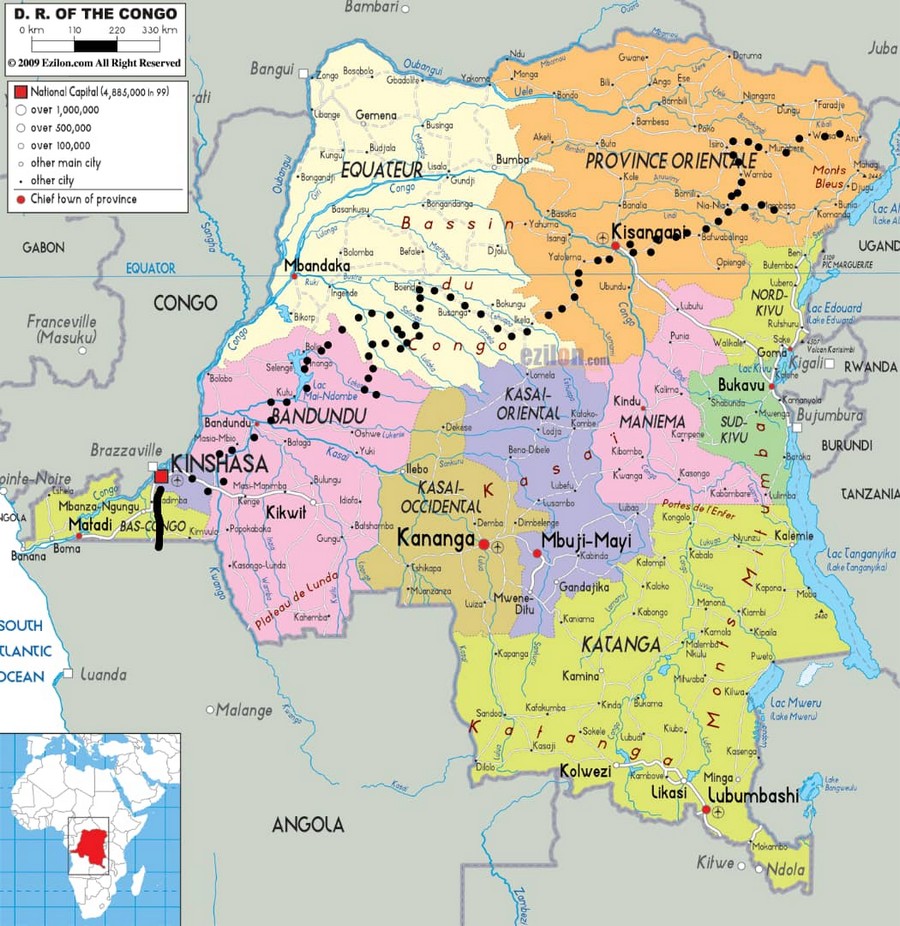
Solo trip overland from Angola to Uganda through the DRC: August 24th-November 17th, 2022
My goal was to visit the DRC far and wide. I was particularly interested in the Congo basin (not the Congo River itself but rather the jungle areas, tropical rainforests, and tributaries of the main river). I like adventure and wanted to see if I could explore the DRC jungle from southwest to northeast without ever taking an airplane to see as much “on the ground” as possible.
This report is long. Buckle up. Hopefully, It will provide valuable information to those visiting the interior DRC. It will give them a sense of what to expect if they follow a similar itinerary. If it ends up helping even just one of you, it will have been worth it.
I got my DRC visa in Bujumbura, Burundi. It’s not typically possible to get it there as a non-resident. They initially outright refused to process my application. I insisted and asked to speak to higher-ups. Eventually, I got invited into someone’s office and talked to the right guy who sympathized with me. Speaking French helped, and we became friends. I told him I didn’t want to return to Canada to get the visa when I was close to the DRC.
He said I could get a visa with a letter of invitation prise en charge. I got it for $150 from Jean-Paul (Whatsapp +243 990 622 714). I returned to the embassy a few days later with the prise en charge document and got my DRC visa in less than an hour. $250, three months multi-entry from the day of entry ($200 for single entry 3 months). I had a 3-month window to enter the country.
From Angola to Kinshasa
After getting my DRC visa in Burundi (June), I traveled through Africa to the Maqela do Zombo in northern Angola in late August. From there, I got a motorbike taxi that agreed to take me to the remote Congolese border of Kimdupulu for about $7. The road there is a sand/dirt track. I was stamped out of Angola (the stamp barely had any ink on it anymore, and the old Portuguese building looked like it hadn’t been cleaned in 50 years).
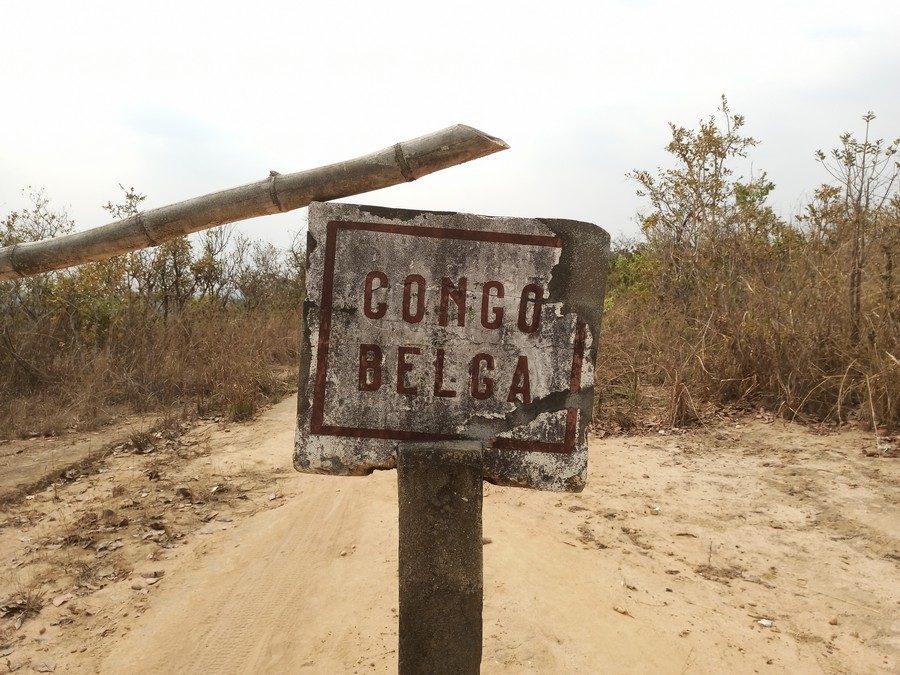
Once, on the Congolese side, I met the Kimdupulu immigration agent, Jean Claud, who works for the Direction Générale de Migration (DGM). Jean Claude’s office was a wooden cabin. His colleagues from the secret police (ANR) and regular police wanted to investigate and make issues for me. They asked me to come to their office to see my passport, but Jean-Claude said, “Passports are the business of DGM, hands off.”
He was extremely friendly and invited me to stay at his house for the night. To my surprise, he gave me his bed to sleep in! He even gave me a meal, a SIM card, and a beer and didn’t ask me a single dollar. He rarely, if ever, sees foreigners crossing here, so he wanted to celebrate with royal hospitality.
The next day, I paid a motorbike to get me to Nsangi (20,000 francs, 2,000 francs = $1) and another to Kisantu (20k). The Kisantu DGM chief told me I had forgotten to pay money for my entrance stamp and should pay him (bribe), but I befriended him and managed to escape his clutches. I hitchhiked on possibly the country’s only “good” road with a truck to go to Kinshasa.
On the way, a truck full of cement bags dropped some merchandise, and the road was blocked for 3 hours. People helped clear out the mess in exchange for payments from the truck driver. I eventually reached Kinshasa at night, where my Couchsurfing host awaited me.
KINSHASA
I didn’t stay long in Kinshasa as I was eager to carry deeper into the country and worried about time constraints. I visited the memorial of the defunct president Laurent Kabila. The monument is nominally free to visit, but my host had to pay a bribe to the guards to let us take pictures.
Kinshasa’s driving is the most insane I have ever seen, even by African standards. Drivers don’t care about pedestrians at all. There’s an uneasiness in the air in Kinshasa. Interestingly, people dress well (suit and tie!) yet live in shantytowns. It’s called la culture des sapeurs.
KINSHASA TO BANDUDVILLE
I hitchhiked out of Kinshasa with motorbikes and trucks on a good tarmac road to Mongata. I slept there for the night in a villager’s barn with his approval to avoid getting harassed by DGM. The road north of Mongata is not tarmac anymore; it’s a sandy road large enough for trucks to pass, but they can only go at 10-15 km/h.
The following day, when I told the inhabitants that I was going to Banduduville, they warned me that there was fighting/killing in the area on the way there and that buses had stopped going in the last few days. The information was blurry, so I decided to try my luck and walk, stopping the occasional motorbike, going in my direction and hopping on board (giving them money whenever asked).
There was one army/police checkpoint on the way that was quite nasty and wanted cash: “$20 for registration.”
He harassed me so much that my motorbike driver left me there because it was too much trouble for him. I tried to leave the barrier on foot (I’d already written down my ID for them), but the guy followed me for 1 km. I turned back, got one inch from his face, and said, “Look, man, I know powerful people in Kinshasa near the president. I’ll get you fired if you don’t leave me alone.”
It worked like magic, and he ran away. Still, no trucks were coming in my direction (a few in the other direction). Eventually, I got a motorbike lift to Machambio, who hosted me.
When I woke up the following morning, I realized the Red Cross (local workers) was in town, and everybody was on alert. I walked out of Machambio, and someone tried to stop me and explain the situation. There was a full-blown tribal war between the Teke and the Yaka. In that area north of Machambio, the Yaka were ethnically cleansing it from Teke people, slaughtering villagers, burning houses, etc. It was genocidal warfare, from what they were saying. He told me that I shouldn’t continue or I’d get killed.
I pondered on his advice, knowing that I was unrelated to the conflict and had nothing to do with it; therefore, I shouldn’t be a target in theory. Some refugees on foot coming from the red zone passed me, and we chatted. They told me it should be fine for me since I wasn’t a Teke; the Yaka had no motive to kill me. This was the only road to Banduduville anyway, so I decided to continue walking and see how things would turn out.

Five km north of Machambio, I stopped at a village—still no traffic northward despite waiting the whole day. I got stuck and slept in the village, fed half-ripe mangoes from the trees. The villagers were adorable, brought me some manioc to eat for dinner, and things seemed normal. I wondered what fuss the people in Machambio had been talking about.
I brought up the topic, and one of the guys eating with me burst out and started ranting. He told me he had been part of a Yaka raiding party the day before, which had killed 4 Tekes (2 grandparents and 2 grandkids).
I politely asked him what was the point of killing innocent children but soon realized it wasn’t a fruitful conversation.
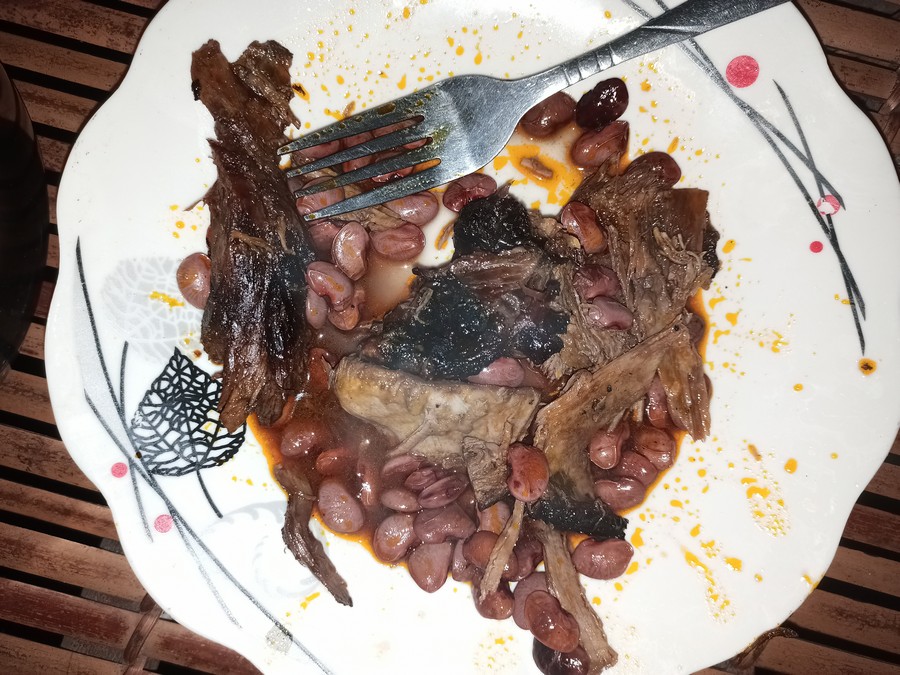
The next morning, there was still no vehicle, so I just walked, getting food and water in the occasional hamlets. Eventually, as I walked, I saw burned houses and signs of destruction in one village. Those villages were previously Teke inhabited and had been completely abandoned.
I finally saw a truck going north and begged him to take me with him, but he refused, blaming “Belgian colonialism and hand cutting.” I told him I was Canadian and we’d never had colonies, but he didn’t seem to care.
I kept walking. Another truck ignored me. Luckily, I’m a good runner, and I was desperate, so I ran in the sand tracks for 10 minutes, keeping pace with the truck going at 10-15 km/h. Eventually, the driver’s girlfriend pitied me and convinced him to let me climb onto the truck’s roof, where the merchandise was loaded and attached with ropes. They told me they’d been afraid to take me because Yaka barriers (roadblocks) were ahead.
The first one was before the village of Mibe. The guy didn’t notice me. He was too focused on asking the driver money to pay for bullets (literally). Then came the real deal.
Right after Mibe, we got stopped by fifteen Yaka rebels with carbines (hunting rifles) and machetes. They had red turbans tied around their heads and what looked like black paint all over their face (the truck driver later told me it’s allegedly part of a magical ritual where they mix it with the blood of victims to gain superhuman powers, they call this magic “fétichisme”).

They asked everyone in the truck to get down (including two hitchhikers on the roof with me) to check their IDs and inspect them to find any potential Teke. I realized these guys were not sober by looking at their eyes. They were 100% high on drugs.
One guy saw me and asked me to come down and give him money. I politely ignored him and stayed on the truck’s roof, where I felt safer.
I locked my gaze with another rebel, the only one that seemed sober. He immediately made me feel comfortable with sign language and gestured for me to stay where I was and that everything would be alright. This man gave me the most reassuring look I’ve ever witnessed in my whole life. It meant, “Don’t worry, it’s not you that we are after; relax, you’ll be fine.”
After minutes that felt like an eternity due to my nervous state, some of the genocidal Yakas climbed with their machetes and weapons on the roof of the truck where I was to hitch a lift to their next roadblock. It was straight out of a Hollywood movie. We dropped the militiamen at the roadblock a few kilometers down and then got to Bethanie.
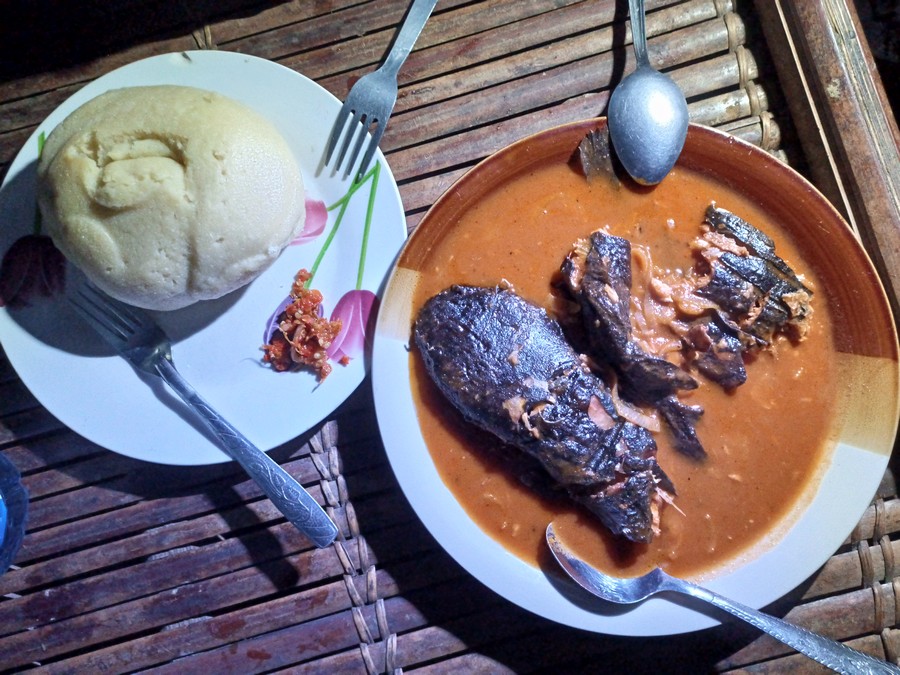
From that area onwards, it was under Teke control, but we were told there’d be no rebel roadblocks since it was closer to Banduduville, and the Congolese army had more muscle to enforce the law in that area. Indeed, I saw FARDC (DRC army) personnel in Bethanie, so it made sense.
Finally, we reached Ngadambo at night. Across the Kwilu River was Banduduville. Unfortunately, we couldn’t cross by boat at night because the authorities didn’t allow it (some VIP local man drowned at night last year, and they don’t allow night crossings anymore).
BANDUDVILLE TO KIRI
I tried to board a boat the next morning to Banduduville but was harassed by different branches of police who threatened to physically remove me from the ship if I didn’t report to their office. I complied.
There was a lot of shouting, and two hours later, I was on the other side meeting with Father Franek, a Polish missionary who’s been in the DRC since 2002.

Through a mutual friend, he’d invited me to stay with him for free at the Saint Paul catholic mission in town. I recharged the batteries, staying with him.
As you can imagine, he has fascinating stories to share. If you ever go to Banduduville, please visit the St. Paul mission. Franek feels lonely and wants to meet more foreigners. Greet him on my behalf.
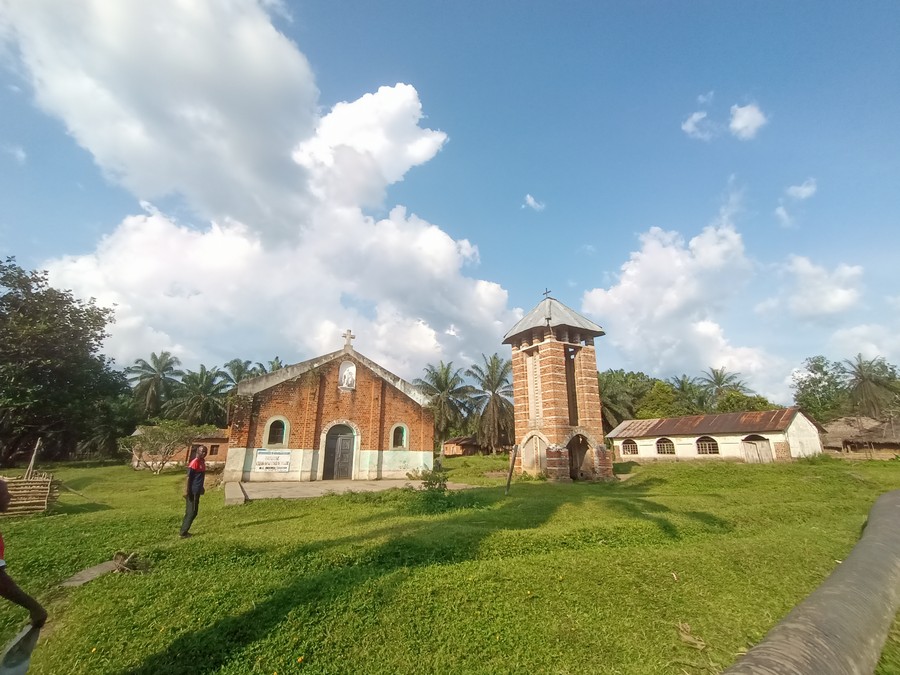
From now on, the sandy tracks wouldn’t be large enough for trucks, only for bikes. I paid 15,000 francs for a motorcycle to take me to Bendela.
At the river crossing before Bendela, the DGM guy thought I was a missionary (my visa category said “ordinary,” not “tourist,” and he thought it was for missionaries, haha). He asked me for money, but it wasn’t too much trouble overall.
It was nighttime. I tried to walk out of Bendela to avoid getting seen by the authorities, but they caught me and wasted my time as usual.
A football game was on TV so they didn’t want to miss it. Therefore, they forcefully put me in a hotel and told me that they’d meet me in the morning and that I wasn’t allowed to continue my journey. Thirty minutes after they left, I pretended to want to get a bite outside and just fled into the darkness of the savannah.
Luckily, there’s so little electricity in that area that at night, it’s pitch black, so I knew they wouldn’t find me, let alone spend money on fuel to chase me.
I walked to Keshu and then paid a guy to get me to Cefa, where I spent the night in a villager’s home (I had a sleeping bag and didn’t mind sleeping on the floor).
The next day, I paid for a 25,000 bike to get me to Isaka. In Isaka, a DGM guy at the river was super friendly. They only asked me if I had “something for him” but didn’t push it, even giving me a fruit I’d never seen before.
The DRC has indigenous fruits not seen elsewhere (check the pictures). The river crossing to Nyoki was only 3000 francs.
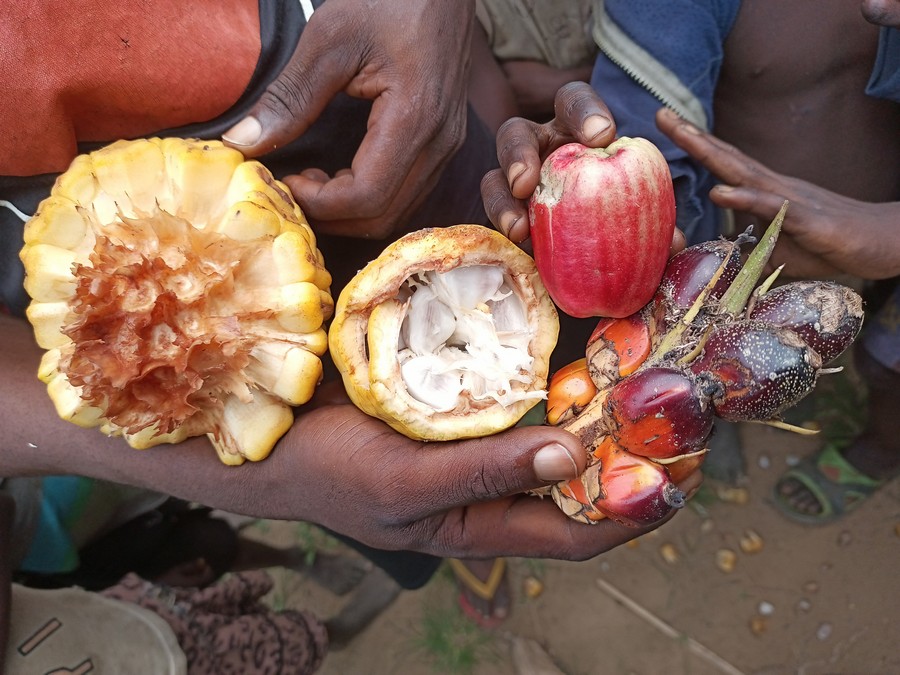
In Nyoki, I was checked by the DGM as I arrived at the port. No bribes asked, surprisingly.
ANR wanted to check me too, so I used the line that the friendly border guy had used: “Passports are the business of the DGM, not theirs,” and it worked (I played them against each other; the different services compete and dislike each other).
I asked about boats “baleinières” to Inongo and was told there’d be one tomorrow. I crashed at the Saint-Michel Catholic mission for the night. People were very kind in Nyoki. I liked the town vibe.

Tip: in the DRC, when people are looking for a way to go somewhere, they say, “Chercher une occasion vers XYZ.” That’s the phrase you want to use. It means “looking for an opportunity towards XYZ.” Yes, they use the word “opportunity” for transport because it’s so unreliable and unpredictable here… if you say “Je cherche une occasion,” people will understand and help you.
The next day, I bought a ticket to Inongo for 15,000 francs. We left around 2 pm. I chilled on the top deck and read my Kindle ebook, looking at the horizon.
The toilet facility on Baleinieres is on the top deck at the back. It’s a plank of wood with a hole, and the Mai Ndombe Lake is directly underneath it. Your stools go straight to feed the fish in the lake.
Some passengers cook rice with dirty lake water on the boat and sell it for 2000 francs. I ate the rice. People on the ship were incredibly kind of surprised to have a white fellow passenger.

We got shipwrecked on a sandbank at night and caught under a terrible tropical thunderstorm. It was raining cats and dogs. Stuck in the storm, all the passengers entered the boat’s cave, but it was too crowded, and I felt suffocating, so I stood in the “toilet” for hours, waiting for the rain to stop eventually.
The next day, many guys jumped in the water and tried to push the boat out of the sand, with no success.
We had to unload the vessel onto other nearby fishing boats (thank God those fishermen were there!), and then guys jumped back into the water, pushed the boat, and reloaded the ship. We carried on with our journey and anchored at night near the lakeshore. The following day, we arrived in Inongo.

In Inongo, I was again bothered by the DGM minions who wanted to bring me to their boss to show off their “catch.”
I was apprehensive, but the boss turned out to be an educated man who’d studied in France and was super friendly. He even gave me his number in case I had any issues.
At the port, I asked which ships were going further inland and boarded a baleiniere to Kiri for 10,000 francs. We were packed to the brim with people, like sardines, all sleeping on the top deck against each other on the floor. It’s good that it didn’t rain that night, or we would have all been soaked!

My advice: stay near the “toilet” at the back. You’ll likely have tummy issues by that point in your trip, and having to walk over countless human bodies in the dark at night to relieve yourself is not fun. Luckily, we didn’t shipwreck this time and arrived in Kiri without issues.

INTO THE JUNGLE: KIRI TO MONKONTO
Up until that point, the landscape was mostly savannah. Kiri is when the deep jungle started in my journey. The DGM guy wasn’t too bad in Kiri. I was invited to eat caterpillar soup at the house of a fellow boat passenger.
I then went to the catholic mission to stay for the night (free of cost; they have plenty of spare rooms, be prepared for spider webs, molded mattresses, and rooms not cleaned since the Belgians left, though!). A hunter tried to sell me a captured alligator for 50,000 francs.
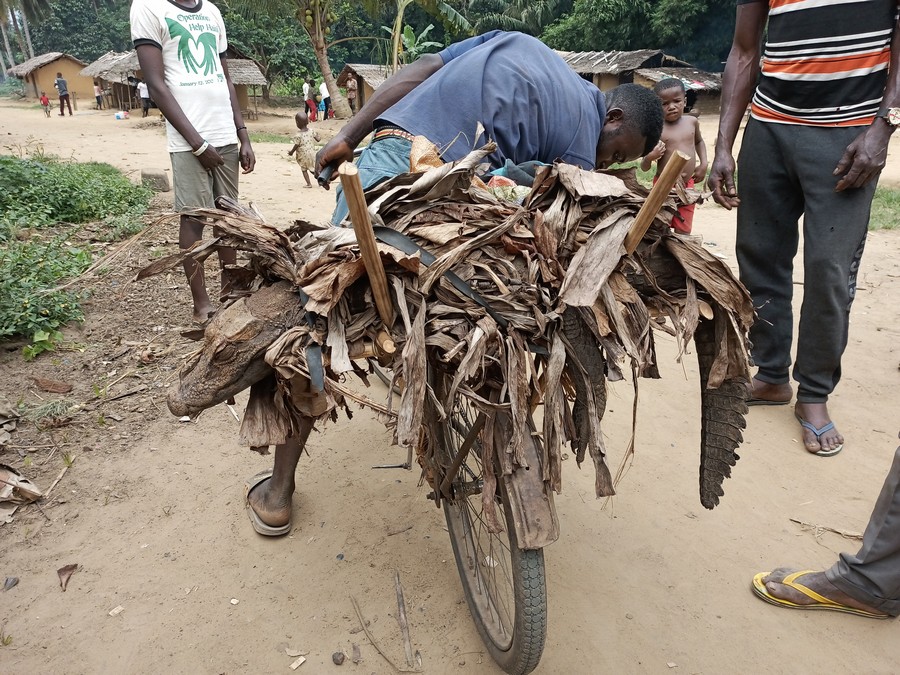
The following day, I went with a fellow boat passenger to Pendjua, about 60km north of Kiri. We paid 30,000 francs because fuel is expensive in that area of the DRC. The road was terrible, with broken wooden bridges and swamps. He hosted me in his home there.
I was harassed by the ANR (secret police) in their office, the officer telling me I had a ‘’fake passport that couldn’t be authenticated.”
I used the “I know powerful people in Kinshasa who know your boss; behave, or I’ll get you fired” line. Suddenly, my passport was perfectly valid in his eyes. I was let go.
The next day, I decided to visit Salonga National Park further east, forcing me to walk 90km to Boyera because the “trail” between Pendjua and Boyera was not passable by bike, according to locals. I set out on foot the next day.
The issue is that certain sections of the trail had been flooded, and I was walking in water, sometimes up to my knees, Indiana Jones style. This meant either soaking my sneakers or walking barefoot, getting exposed to parasites and worms in the mud.
I chose the latter. The locals put up with such horrible conditions in this part of the world. It’s insane. I have a lot of respect for how tough they are.
On the way, I would see pygmies with bows and arrows on hunting journeys, looking for game. I later learned that the Bantus call them “semi-Bantus” because they are heavily mixed with the Bantus. They are taller than “pure pygmies.”

I spent the first night 27km into the trail. It was getting dark (sunset), and a local Branamist pastor (a Christian sect) invited me to stay at his home. His house was surrounded by literally hundreds of villagers wanting to see me.
The pastor said I was the first white person to visit them since the Belgians left. Most of the people there have never left their village, so a white person is a novelty. If you ever find yourself in that area of the world, be prepared. It’s like nothing I’ve ever experienced elsewhere in Africa. They will stay for HOURS, just staring at you nonstop. Be prepared for two hundred people surrounding you.
My host cooked some wild boar caught by pygmies. Unfortunately, the meat was teeming with live worms. I asked my host about it. He said he was used to eating meat like that. I politely asked to boil the meat to kill the worms.
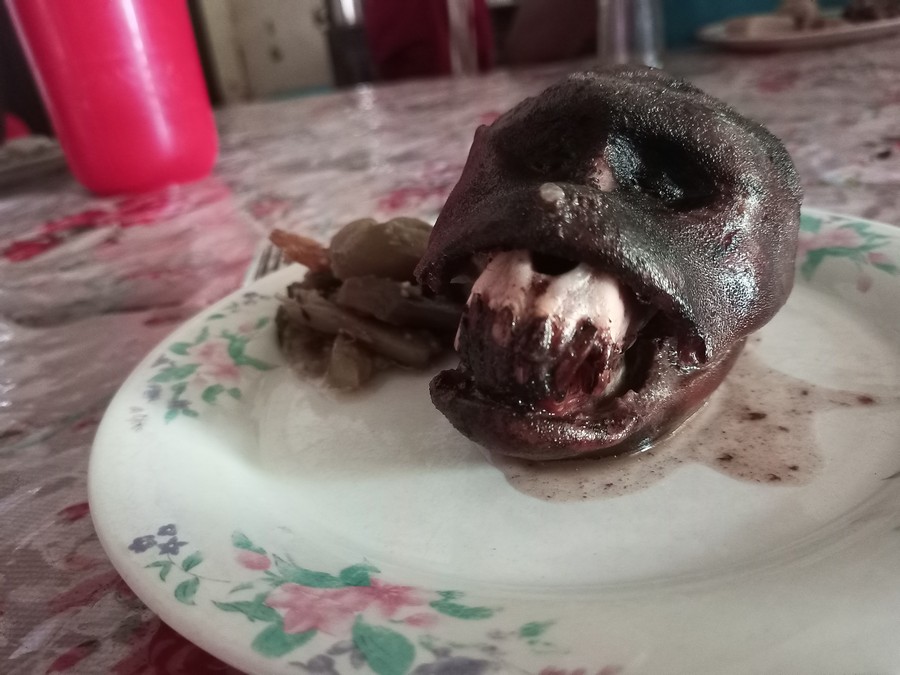
The next day, I continued, the flooding was awful. The trail sometimes turned into a lake, and people with canoes offered to take people across for a fee.
I managed to walk 32 km and stayed at someone’s home. I found it interesting that bamboo is ubiquitous in that area of the DRC jungle and makes for an enjoyable trekking environment. I finally made it to Boyera on the Momboyo River on the third day.

In Boyera, I met Alain, the police commander. He had never seen a white person come out of this section of the jungle on foot and was understandably quite suspicious of me initially. After inspecting my documents and friendly chatting, he hosted me in his house.
He told me the people in the village were afraid of me because they weren’t used to outsiders. His wife made us delicious homemade food while discussing the law-and-order situation of the jungle.
The next morning, I had to find a way to continue my journey. The problem is that from Boyera onwards, there was no road, only the Momboyo River. I hired the local pastor and his son to take me to Nkassa for 15,000 francs in their fishing pirogue and canoe. The canoe was very unstable, so I just lay down to help balance it out while they paddled. I didn’t want to risk capsizing and losing my $2,000 in cash and my passport in the river.
Water leaked inside, and I’d scoop it out to pass the time. The two guys were very professional and did a great job.

We reached Nkassa after about 6 hours, and they turned back (the average speed going upriver seems to be 4-5 km/h).
In Nkassa, I met the police commander there. He was drunk (he is an aggressive alcoholic). He started pestering and screaming at me, but luckily, the local chief came to fetch me, alerted by the locals.
He told me that the population hates this drunken government-appointed commander, that he terrorizes the people, and that they’ve been trying to get rid of him for years. What a contrast with Alain, the previous commander! The chief said ‘’please help us get him fired; do something.”
Unfortunately, I don’t think I have much power on who the DRC government appoints, but if you have contacts, let him know about the Nkassa situation. I stayed over at the pastor’s house for the night.
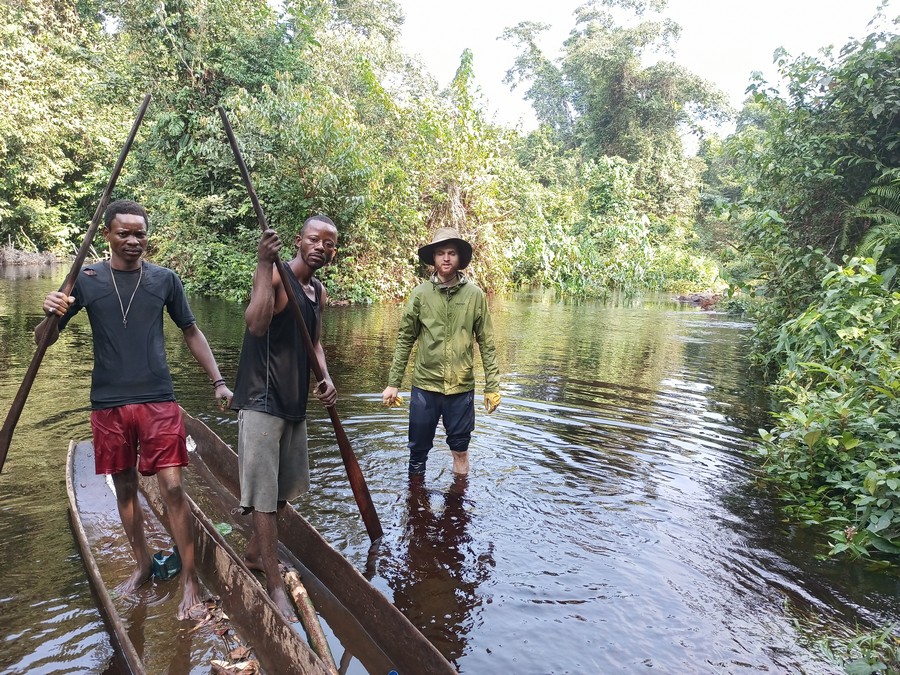
The following day, he helped me find two fishermen to take me to Imbongo for 10,000 francs.
A few hours into the journey, the most unexpected thing happened: a motorized canoe came out of nowhere, pulled over beside us, and a guy told me to jump in.
It turned out that a priest returned to his church in Wafanya, close to Salonga National Park. He’d stopped to resupply at Nkassa, and the amazingly friendly pastor asked him to give me a lift if possible. This was my first time boat hitchhiking! This man saved me; otherwise, I would have had to take a dozen man-powered canoes over 10 days to reach my destination.
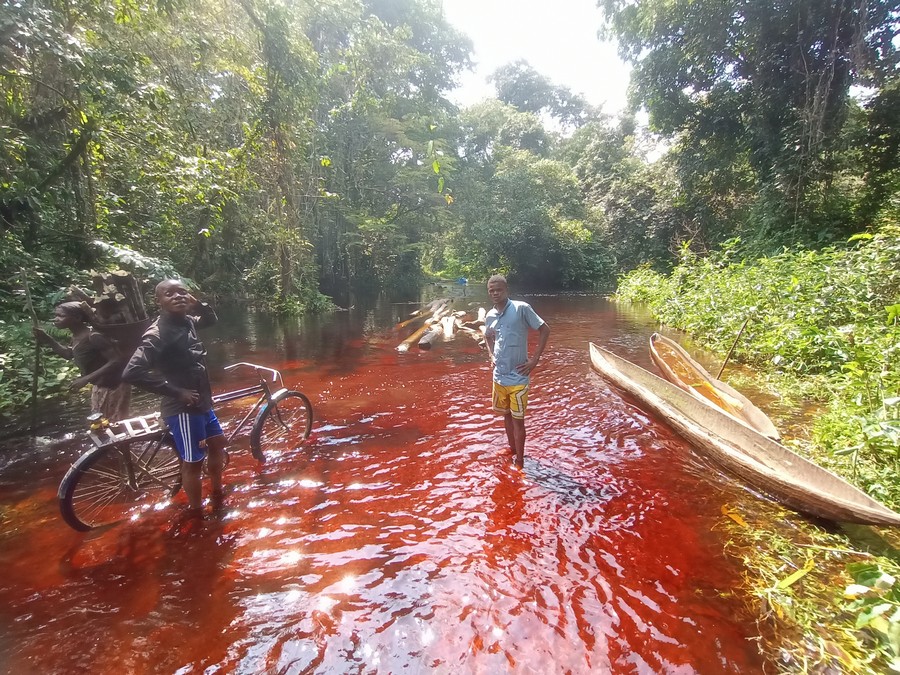
The trip with the motorized canoe took about 24 hours. We slept on the boat and stopped in remote villages with beautiful colonial churches from the Belgian era.
In Wafania, I hung out with the priests for a few days.
They eat many monkeys. One day, a pygmy hunter brought a freshly killed monkey to the priests. They boiled it and gave me the head and brain to eat. It’s a sign of respect in their culture. The brain tasted like tofu, and the meat tasted like elk (gamy).
I then got a bike to Monkonto (the priest gifted the oil from his reserve because he wanted to give me a good impression of his parish, and I paid his driver 20,000 francs).
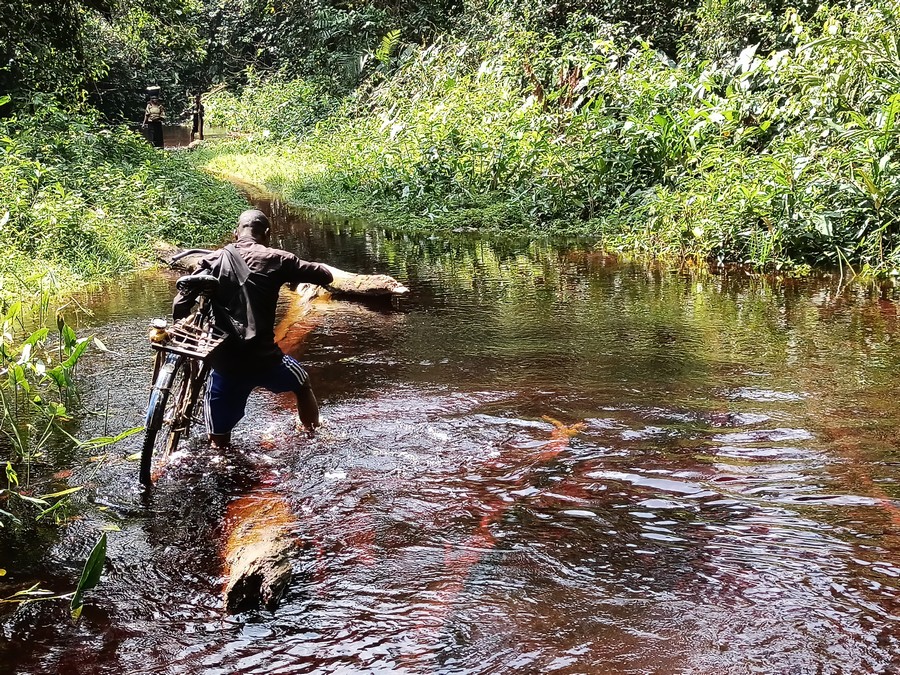
MONKONTO, SALONGA NATIONAL PARK: TO THE BONOBOS
After arriving in Monkonto, I was surprised that the phone network didn’t work in the town even though I had been told it would work. Luckily, a local NGO worker near the catholic mission has an office with satellite Wi-Fi.
I connected with my loved ones to tell them my whereabouts (it had been 2 weeks without a signal). I was then summoned to the police headquarters and harassed by the police and DGM, all the typical BS.

Then, guys angrily shouted at me.
They aggressively told me that I didn’t have the proper documents to be here, that I was a spy, blablabla.
Luckily, I had a voice recording of the priest from Wafania in Lingala, the local language, explaining who I was. When I played the recording, the adjunct commander (prefet) told me he’d looked into the situation and allowed me to leave his office (apparently, his big boss was a friend of the Wafania priest).
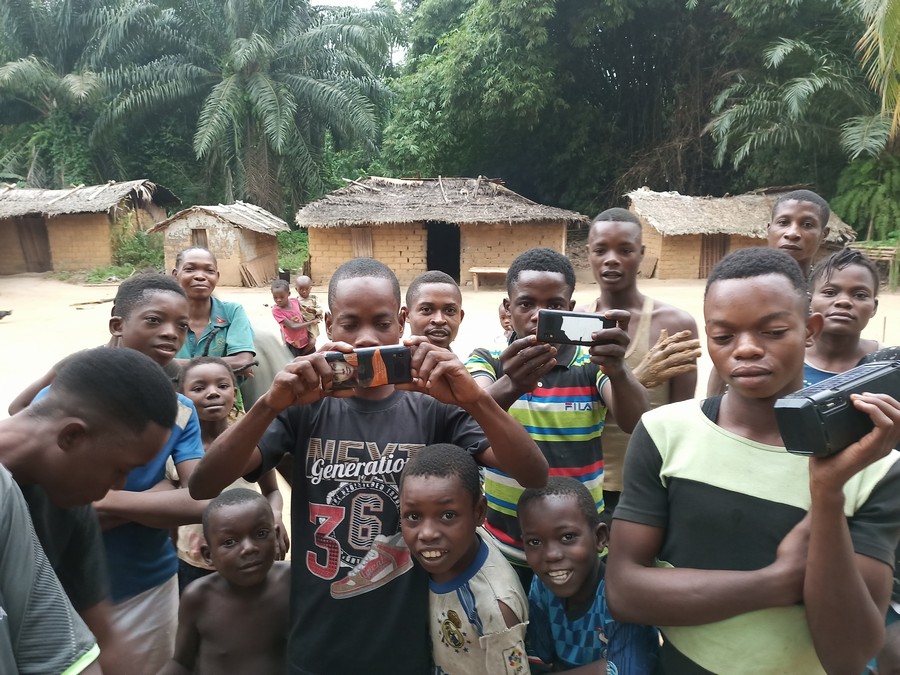
I then went to the Salonga National Park headquarters to enquire about tourist activities and the possibility of seeing wildlife with them. To my utter dismay, I was told they had 0 tourist infrastructure.
They told me I was the first tourist they’d seen at the park headquarters. One of the park representatives told me they sometimes give nature walks to government kleptocrats flying in from Kinshasa, but that was about it. They mainly focus on training park rangers and fending off poachers. They do a bit of biomonitoring of animals as well.

I asked the chief bio-monitor, Dieu-Merci, “If I pay you, can you take me on a nature walk to see some wildlife?”
He replied, “The park is not ready to accommodate tourists. We have no experience doing such things. I must ask my bosses to see what can be done and plan something. Moreover, the bonobos here run away from humans due to poachers, so you won’t see them. If we get permission to take you on a nature walk, the best we could do is spot some forest elephants at night, but that will be costly since it’s tailored for government officials.”
“Are there some scientists that I could meet in the jungle? Any researchers habituating bonobos to humans and studying them?” I asked him.
“Yes.”
And that’s how I learned about scientists studying bonobos deep in the jungle near Luikotale. The problem was that there was no way to contact them since they had no phone signal and we only had satellite Wi-Fi. Moreover, I probably wouldn’t even be allowed to visit if I asked them because of ‘’protocol.”

I figured my best bet was to make the massive detour deep into the forest, find a way to get there and ask permission on the spot. I thought I’d have a better chance to sell myself that way. I was prepared to pay them money; I would have tried if they had turned me down.
The bio-monitor told me, “I don’t know how you will get there since we normally get our ICCN park rangers into that zone with a small plane, and the next flight is not scheduled yet. I’ve never gone overland. You’d need to return to Wafanya and Boleko, then south from there.”

Not wanting to waste time, I hired a bike back to Wafanya. I hate to backtrack on trips, but the thought of seeing wild apes was too alluring.
I decided to keep only about 400 dollars on me for this detour expedition and leave the rest of my money hidden in my main bag under the priest’s bed in Wafania ($1,600). If a canoe capsized on the way, I wouldn’t lose everything!
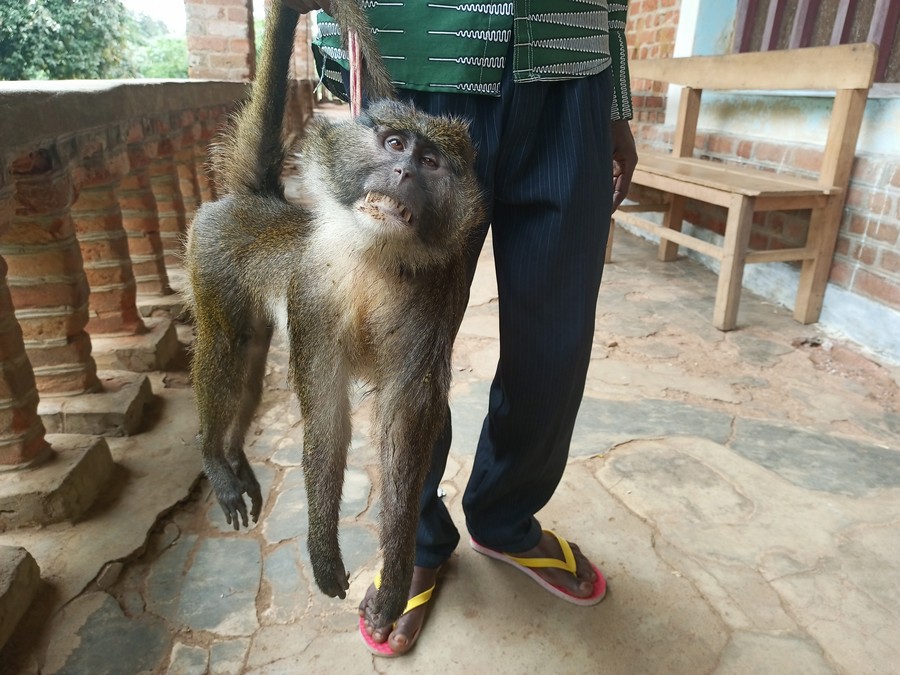
The next day, the doctor in Wafanya, ’Monsieur Taylor, lent me his bike for about 35,000 francs, including oil, and a young teenager as the driver to get me to Boleko.
The bike broke down multiple times on the way, and I often had to get off because it couldn’t carry us both through swamps. Once in Boleko, I asked to cross to Bompombo, and luckily, some people were prepared to go there with a “passeur d’eau,” the French name the Congolese give to people who take you on their canoe for a fee.
This one was inquisitive about me. He was an albino and had suffered a lot from it, from what I gathered. I felt terrible for him. Albinos are called “blancs rates” in the DRC, which translates to “failed white men.”
It took about an hour to get to Bompombo by canoe through thick swamplands (river flooding).

I got to Bompombo, and nightfall came quickly, but I didn’t want to waste time. Once there, I walked about 17km to Bolanda. (note: if you ever find yourself here, bring power; you’ll need to use your phone as a flashlight because the moonlight doesn’t penetrate the thick canopy; it’s as dark as having your eyes shut!). Nightwalking alone in the jungle is fun. Bring some music on to lighten up your mood if you feel scared.
Leopards are said not to attack humans, so you should be fine. I finally reached Bolanda, which is a hamlet. I asked if someone spoke French, and I was taken to the school director’s hut for the night.

Tip: good protein sources can be hard to find in interior DRC if you’re not fond of their insects, but people raise poultry, and you can get someone to kill a chicken and boil it for 5,000 francs ($2.50).
Boiled Cassava is also a good source of carbohydrates, and I like it. But don’t expect a very diverse menu!

The following day, I went to the shore of the Loso River to get a fisherman to take me across to Bokongombolo (about 15 km away). Other people also wanted to go, so I got a reasonable price of 5000 francs after complex negotiations. Just as we were leaving, I was summoned back to the hamlet! Be careful. There’s a small army outpost in Bokongombolo.
The soldier was livid, telling me I hadn’t reported my presence to him the night before, and he was threatening me. I called him out and told him I knew he was looking for a bribe, and I was rushing to leave on the river.
The tension escalated as I didn’t back down because I was in a hurry to get to the boat and didn’t want to miss my transport!
Soon enough, he was trying to intimidate me by punching his fists one inch from my face, telling me, “I’m a black belt Karate fighter. Do you want to fight me?” at which point I got into a fight or flight mode and said “you want to fight!?” and instinctively chokehold him for a few seconds.
He immediately asked me to release him, and his mood drastically improved after that (I had called out his bluff).
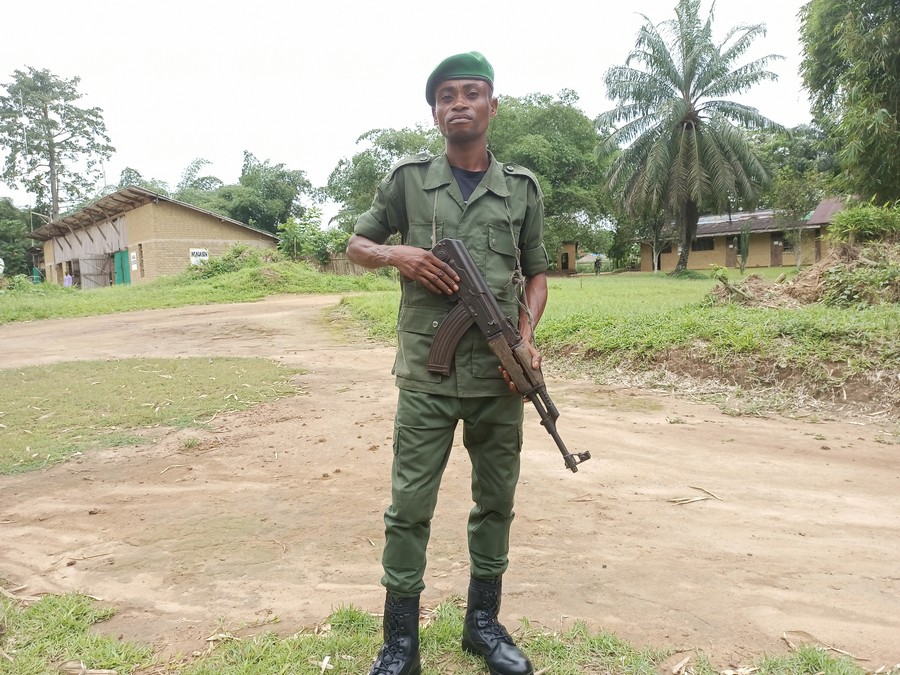
He was completely different and went from being very hostile to very agreeable.
He didn’t even ask to see my physical passport and just let me go after I wrote down my passport number and my name on a bogus piece of paper so he wouldn’t lose face. I eagerly went back to the canoe and set off.
In hindsight, I would not have acted that way, but in the heat of the moment, with adrenaline pumping, you never know how you will react.
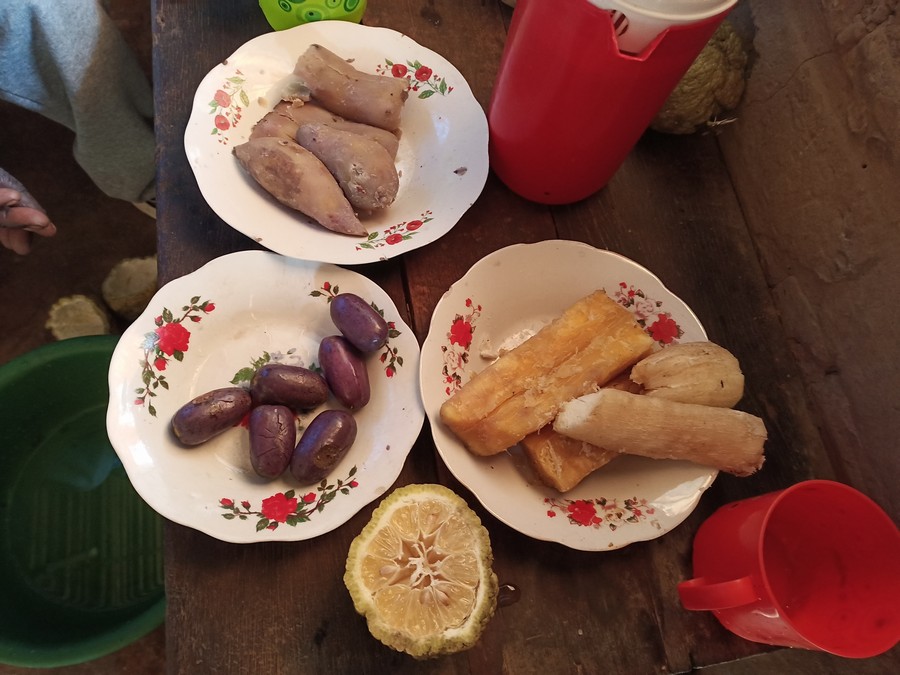
It took about two hours to get to Bokongombolo (going upstream). From there, I walked 5 km to a village called Bolongoweitchi.
I had been told there would be motorbikes here, but there were none! I didn’t want to walk 150+km to Luikotale. I asked if I could rent someone’s bicycle because there were no motorbikes in the area. Unfortunately, this is where I made the biggest mistake of my trip!
I found someone who told me I could rent his bicycle for 5,000 francs and drop it at his cousin’s in the village of Bisenge Batwa, about 60km away. He said there might be motorbikes there to continue onwards. So I rented his bicycle and set off.
The problem was that the rusty bike had no speed gear or brakes, the tires weren’t sufficiently inflated, and the seat was dilapidated. At the time, I thought using a bicycle would be faster than walking. I was wrong.
Unless you are a Congolese who grew up in the jungle and is used to cycling in that type of environment with shitty bicycles, DON’T TRY IT!!
It took me two days to reach Bisenge Batwa (I slept halfway), and I got cyclist palsy (UIvar nerve injury) on my right hand for months after that and couldn’t eat with my right hand. Walking here is better than cycling unless you have a unique all-terrain bicycle with brakes.
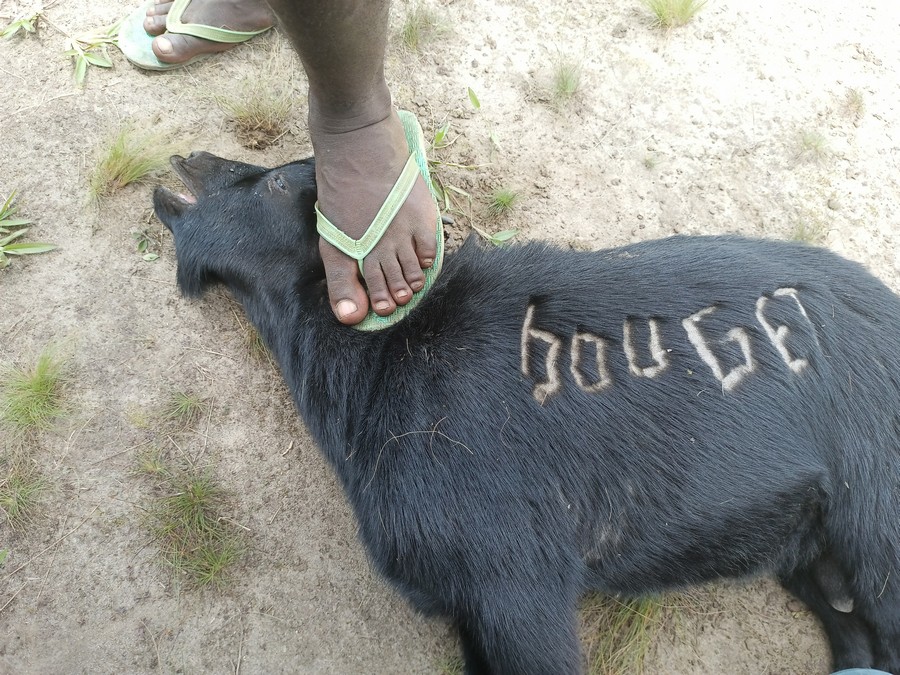
In Bisenge Batwa, I recovered from the harrowing journey to a man’s home called Rambo and gave him the bicycle that I had rented. Rambo is a nurse and the hamlet’s most educated man. He speaks fluent French.
The bad news was that his motorbike was broken and he didn’t have enough fuel to take me where I wanted. Fuel is a rare commodity in this part of the jungle.
The good news is that the only person in the hamlet with a motorbike agreed to lend it to him so he could take me further. He took me 16km farther to Nkopo, where he passed me to one of his friends with a bike with more fuel.
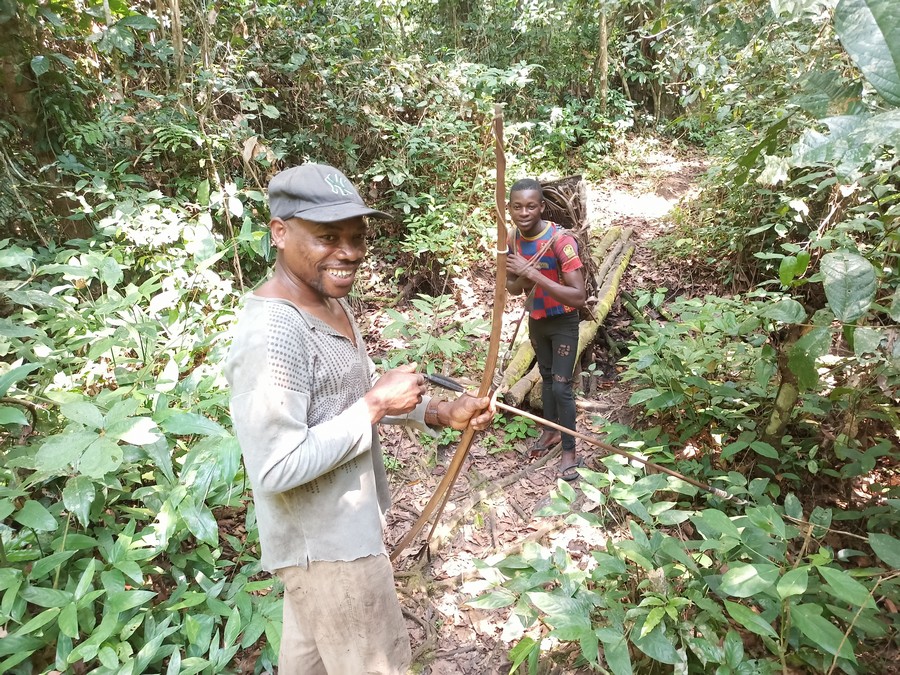
The friend agreed to take me to Mundja (about 76km away) for 50,000 francs, all expenses included. He’d never been there before.
The trip was very tough. We constantly had to lift the motorbike over fallen trees and other jungle obstacles. Whenever we came to a hamlet, dogs would chase us and try to bite our ankles because they weren’t used to motorbikes and thought we were some strange animal.
On the way, we found only ONE village with some gasoline. They didn’t have much, but my driver refueled anyway because he didn’t have enough in his tank. While he was refueling, a local tribal chief ‘’chef de groupement’’ gifted me a piece of leopard skin.

Five km before Mundja, we ran out of fuel (we hadn’t refueled enough, and the rugged terrain made the bike burn more than we’d expected). We asked some locals to keep the bike safe while we walked to Mundja. I hoped we could get fuel there from the ICCN park rangers so my driver could safely return home. As we arrived, they were pretty surprised to see us.
The bio-monitor in Monkonto had told the Mundja head park ranger, commander Sendi, that a white tourist had wanted to come, but none of them thought I was seriously going to make it.
Luckily, they had a fuel reserve. He agreed to sell fuel at 6,000 francs a liter, and my driver brought the gasoline with him and went off after being fed a nice meal by the ICCN rangers.
I was pleasantly surprised that the ICCN Mundja station has satellite internet; I could connect with loved ones. I then enquired about the scientists, and Commander Sendi confirmed their presence, telling me I would need to go to a hamlet called Ipope 15 km away.
He kindly lent me a headtorch as I set off at nighttime. I reached Ipope, gave the headtorch to the local doctor there who is friends with Sendi, and pitched up for the night.
The next day, I made it to Lumpole, 3 km away, where I met a man called Mara who works with the scientists.

Mara explained that he was the Congolese man who maintained a good relationship between the scientists and the local population. He also told me that I was fortunate because some scientists would come out of the jungle that day to fly out in a few days from Ipope, and I could meet them and explain my project to them.
Sure enough, a group of white people came out of the jungle at night, and we had dinner at Mara’s home. They were very curious as to how I had managed to get there. We got friendly.
Barbara, the leading scientist and head of the project, agreed to let me visit the camp and the bonobos in the forest FOR FREE! I was delighted and thankful. I think she felt pity for me to have come all the way there and didn’t want to turn me down. She clearly explained it’s typically forbidden to visit the site unless you are part of the project. I’d be considered a “volunteer” for a few days.

In the next few days, I got to know the scientists better, and some of them left by airplane from Ipope (the ‘’airport’’ is a cleared field in the jungle where a tiny aircraft company that caters to Christian missionaries flies in and out once every 2-3 months.
There are no scheduled flights. It all depends on when new scientists arrive or leave). Some scientists left, and newcomers arrived.
We started the trek from Lumpole to Luikotale. It’s a 25 km distance. There’s a river to cross, the Lokoro. We finally reached Luikotale, where I met the other scientists there. I enjoyed my time there. Be careful. They have no anti-poison snake medicines or any anti-venom. Lethal snakes are ubiquitous in that area. Before being allowed on the site, everyone must sign a paper saying they are responsible if they die, etc.
The wildlife was surreal. I saw flying squirrels, butterflies and birds, and miniature monkeys. Some local workers cook for the scientists, and others help them with the bonobos. The rations are small; everyone there told me they lost weight. I slept in one of the huts.

After a few days, I set off to see the bonobos with two local workers. The bonobos roamed about a 10 km trek from the main camp that day. It was a delight to see them eat, play, and copulate in the forest in their natural environment. Beware! You will be walking in a wild forest with no tracks.
You can easily get lost if you lose sight of the local workers! Wild bees, carnivorous ants, and various dangers are around, so just be smart.
I kept getting my ankles caught in vines, and it was difficult to walk without falling every 30 seconds. Now I understand why the pygmies are so short; it’s an evolutionary adaptation to thrive better in the thick jungle!

FROM THE BONOBOS BACK TO WAFANYA
I started feeling sick and weak in Luikotale and wanted to get out before things got rotten because it was remote. I bid farewell to the friendly scientists and trekked back to Lumpole with a local worker. From there, I made it to Ipope, where I realized that all my money (more than $300) in my wallet had been stolen!
It must have happened when I stayed at Mara’s house in Lumpole. I often left my bag in my hut and went to the ‘’bathroom’’ (hole in the ground). An intelligent thief probably took advantage of my absence to go inside my hut and empty out the cash.

Luckily, I had left about 15,000 francs in my jacket pocket. That would be just enough to cover the river crossings to Boleko. But not enough for bikes or food. I trekked 15 km to Mundja and explained the situation to Commander Sendi. He said I looked sick and I felt terrible by that point (diarrhea, headache, etc), so I did a rapid test and got diagnosed with malaria.
Sendi told me to stay in his house to recover while we looked for a solution. I didn’t feel like walking 165km to Boleko with no money while being sick with malaria. Instead, I rested in his house for three nights while getting terrible fevers.
He asked the village nurse to inject me with a needle because the oral medications weren’t powerful enough. The village nurse was a drunk, and one night, he came to check up on me while wasted.
The commander got angry and chased him out of his house. I eventually refused to get needle injections from this guy because I felt like he didn’t know how to inject appropriately; Sendi later confessed he was incompetent.
I kept to the oral meds. At one point, Sendi feared I was going to die and told me to send a message to my parents on WhatsApp, thanks to satellite Wi-Fi. I got better after a few days.

I came up with an idea. I told Sendi that his bike was the only bike around, and I needed his driver to take me to Bokogombolo, the farthest he could get me by motorbike before the Loso River.
Since I had only enough money on me to pay for the river crossings, I told him that as soon as I got to Wafanya and retrieved my main bag under the priest’s bed, I would take out whatever cash we’d agreed upon now and give it to the priest who would, in turn, give it to Sendi on his next trip to the area.
It turned out that Sendi knew the priest in Wafania. Even better, I messaged the priest on WhatsApp, who happened to have satellite Wi-Fi because he was in Monkonto that day at the catholic mission. It was a miracle!

Sendi spoke to him. When he realized that the priest was indeed his old friend and would make sure I paid him back with my bag hidden at his place, he agreed to a plan. I would pay him 150,000 to rent his motorbike driver to bring me to Bokogombolo (146 km north), the farthest the bike could take me before a major river crossing. Sendi was quite nervous because it was his only functional bike, and he needed his driver, so if something happened to either, he would be screwed.
We set out the following day at dawn. It was a grueling ride as I was still weak and had to help him lift the motorbike over tree trunks. Since I had just enough money left (after being robbed) for the river crossings ahead, AND I also needed to keep a buffer of 5,000 francs because nothing guaranteed that I would cross for the same price as I previously had (it’s all up to negotiations and how the fishermen feel that day); I had to beg villagers for coconuts, bananas, papayas, pineapples, and oranges to feed myself and the biker.
Luckily, these fruits are plentiful in the area, and the villagers were happy to give some away. Congolese hospitality is beautiful.
I later learned that these fruits are so ubiquitous in that area that they are generally given for free among people. We slept halfway through the first night and carried on the next day.
We were now in the area I had previously covered on foot and bicycle. In some sections, the driver had to cut open detours in the forest with a machete.
His motorbike was too heavy to carry over certain fallen logs. After a second day that felt like an eternity, we arrived at sunset in Bokogombolo, where I thanked the driver and promised to give the money to the priest once he arrived in Wafanya.

I slept in Bokogombolo. The next morning, after torturous negotiations, I got a canoe ride back to Bolanda for 5,000 francs. From there, I walked to Bompombo.
On the way, some villagers let me taste some smoked boa snake they’d caught. I wasn’t a fan. It smelled rotten. I managed to get a friendly fisherman to take me to Boleko for 3000 francs.
The man was very kind, and as we spoke about Congo’s past, he gave me a Belgian colonial coin from 1925 as a gift! He’d found it in his garden, I think.
I arrived in Boleko and explained my situation to the locals. I still had 60 km to get to Wafanya, and my diarrhea was getting worse (I got tested for giardia later on; at the time, I didn’t know I was carrying a parasite). Someone let me crash at their place for the night.
The next day, a guy going to Wafanya by motorbike agreed to take me for 30,000 francs. I told him I didn’t have the money but would get it from my hidden bag and pay him, to which he agreed. I finally made it to Wafanya, retrieved my bag under the priest’s bed, paid him 150,000 for the ICCN rangers, gave 30,000 to the moto-taxi, and collapsed on the bed exhausted and sick.
FROM WAFANYA TO BOENDE
I was sick and had many blisters and skin infections (besides major bowel issues) and was treated by Doctor Taylor in Wafanya. One of the blisters under my toe was so infected that I couldn’t walk and limp. He skillfully cut it out with a scalpel to let the pus out and help me walk again. I also got a lot of antibiotics to treat my other infections.
After a few days of recovery, I asked around Wafanya for a bike to take me to Boende, 216 km north. I found one disabled man working for the Ministry of disabled people who could rent me his bike and driver for about 200,000 francs ($100). We shook hands on the deal, I paid him, and I left with his bike & driver.
Unfortunately, after 76 km, the motorcycle broke down. A villager hosted us for the night, and the next morning, the driver told me that he couldn’t repair the bike and that I would need to find another bike to continue.
Luckily, two guys passing by happened to be going to Boende. They were overloaded already, but there’s always more room for money in the DRC, so they somehow managed to squeeze me in with the luggage. Since they were already going to Boende, I got a deal for 20,000 francs. It’s a real bargain (too bad I’d already paid the other guy’s total price). The road was sometimes tricky, and the bike slipped a lot in the mud. We fell off the bike a few times, but luckily, no one got injured.
I arrived in Boende and stayed with the guys who’d taken me. Boende is the capital of Tshuapa province. The phone network barely works, and you can only get internet by going to the local hospital and asking the doctors there to use Wi-Fi. Nonetheless, they have more food options than in the remote jungle, so you can treat yourself to some canned tuna or beans.
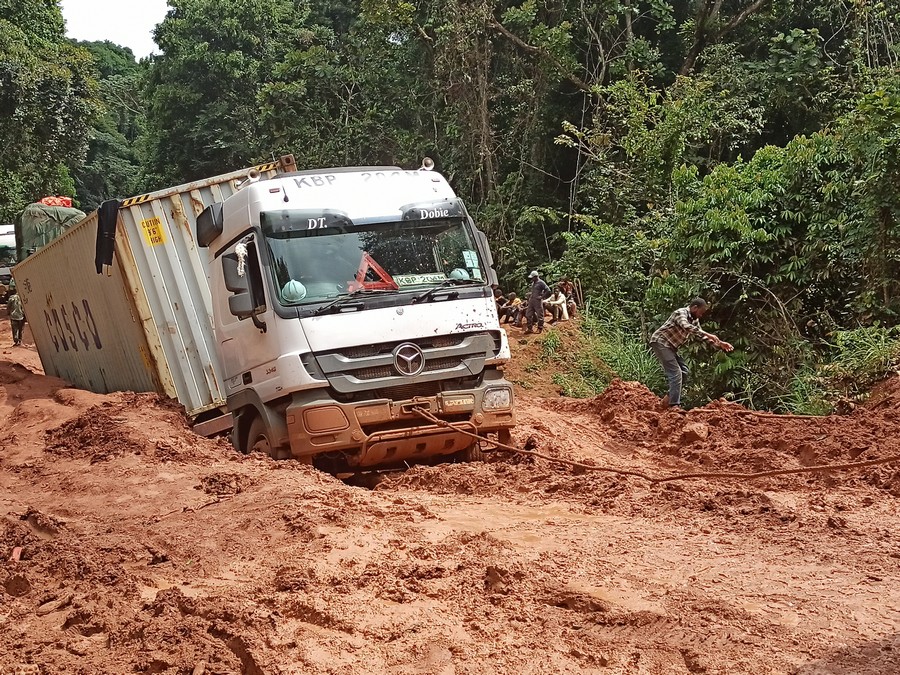
FROM BOENDE TO IKELA
I did my best in Boende to avoid being seen by the authorities, which worked. It was the only major town in the DRC where I managed to do so and thus avoid unnecessary drama. My strategy to get to Kisangani was to stand on the side of the road and hail passing motorbikes and then agree on a price. I knew that would be cheaper than renting a driver. A guy brought me 80 km eastward for 5000 francs. Then I stopped two motorbikes traveling together. They were high-ranked Tshuapa civil servants going to Ikela, 326 km east.
One of them agreed to take me with them for 60,000 francs!
Unfortunately, it rained a lot, and the road was wrecked, so it took us 3 nights and 4 days to reach Ikela. On the way, we would stop at villagers’ homes to sleep (it’s a custom in interior DRC that you should host travelers passing by). A few times, locals made illegal barriers of wood on the way to block incoming traffic and force them to pay a tax.
At one particular barrier, we were swarmed by 50 villagers who aggressively told us we wouldn’t pass unless we paid them a very high fee. They vaguely claimed it was because they had worked on the road, but we couldn’t see any evidence.
They seemed prepared to attack us. My two friends got quite angry at them for behaving so aggressively.
They told them they would not pay and would report their behavior to the governor of Tshuapa, their friend. There was a tense standoff for 30 minutes with a lot of shouting, but eventually, we were let through without paying anything (my friends had to show their government ID cards to add muscle to their threat).

There were other similar instances along the way. One time, a drunken barrier man said I was a mercenary, and my friends had to help me out of his clutches. About 54 km before Ikela, there’s a village run by a man whose father was a Belgian colonial agent but ran away after decolonization, leaving him to be raised by his Congolese single mom. He is a metis. He has interesting stories to share about his life.
When we arrived in Ikela, I was sick again and had a fever (40 degrees when I got tested). But of course, the DGM and military had to come and bother me as soon as we arrived on the eastern shore of the Tshuapa River. They told me to go to the office of the administrator of Ikela, but he wasn’t there.
So, instead, they just wasted 45 minutes looking at my passport and treating me like a criminal just for existing.
I asked them, “You just want to check my passport and register it, right? You’re not going to ask me for money?” they initially said yes and then said, “We’ll see about that,” with a nasty look.
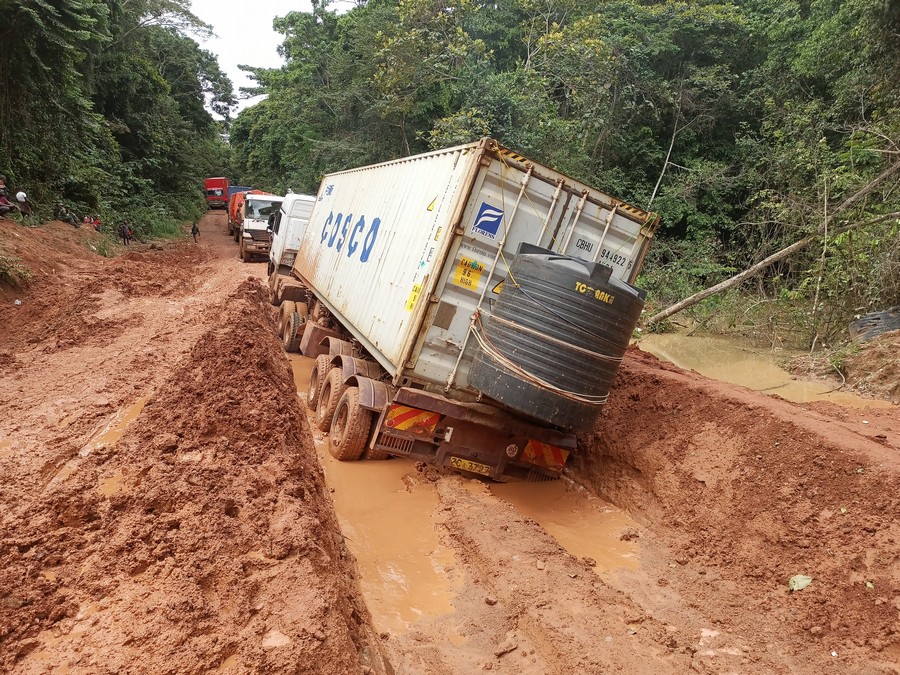
After an hour, I saw they weren’t keen on returning my passport. I snapped it by force from the hands of the DGM guy and told him, “Stop playing games. You had an hour to write down my ID info on paper, and you didn’t do anything. I’m done with you. I need to go to the hospital. I’m sick.”
The army guy was furious and demented; he seemed possessed by a demon and threatened me verbally, so I opened my arms wide and told him, “Ok, what are you going to do? The worst thing you could do to me is to shoot me and throw my body in the river. Do you think it will go well for you once it makes worldwide news and your government investigates? Everyone here (including my two friends) witnesses the situation.”
I took a picture of the DGM guy’s ID and added, “My powerful friends in Kinshasa will find out about you.”
I walked away and went to the hospital that evening. They didn’t follow me.
I got some meds, then rested at my friend’s home for a few days. They had a lot of stories to share, including one having his cousins cooked and eaten by Rwandan cannibalistic soldiers in the Second Congo War.
IKELA TO KISANGANI
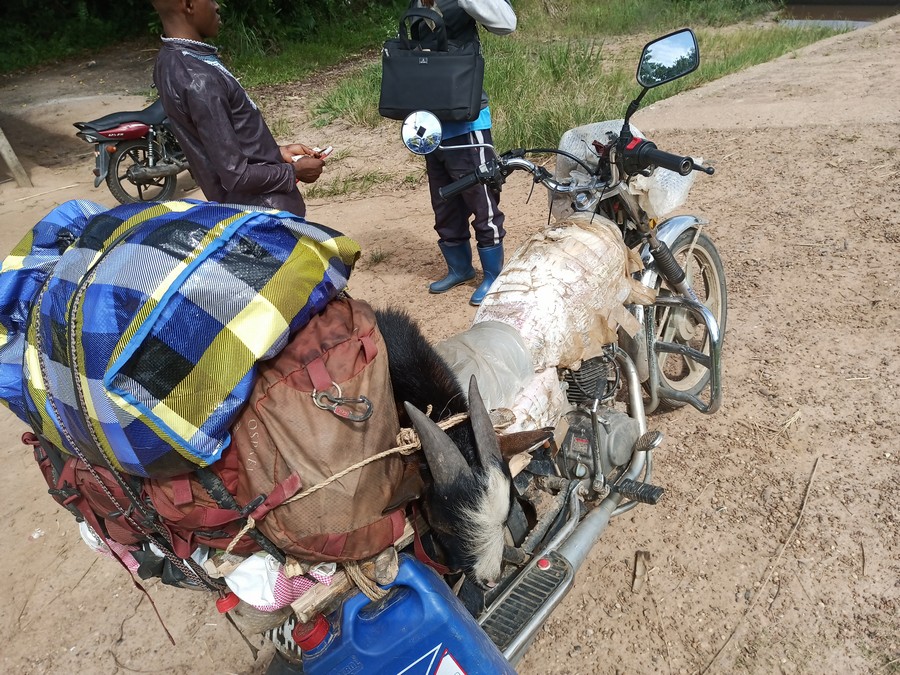
When I was ready to leave Ikela, I walked out and did my usual technique. I got a bike going to Opala, 144 km away, for 30,000 francs.
On the way, we bumped into two FARDC soldiers on a motorcycle around a jungle corner near a clearing with some huts. They were both armed with machine guns but didn’t seem too aggressive. They approached us and asked if I had something for them. ‘’I don’t, sorry,” was my reply. They seemed satisfied, and we quickly sped off.
About 30 km later, at nightfall, we ran into a hamlet with a wooden barrier with a drunken police commander (alcoholism is a big problem in the DRC). He checked my ID and started ranting about nonsense that I didn’t have the proper documentation to be here, etc., “You are before me in front of the state. I am the state.”
I didn’t argue with him and just played audio recordings in Lingala of the Boyera commander Alain and the Wafanya priest. Everyone around heard the recording out loud. He let us go (having Lingala recordings is helpful!).
On the way later on, my motorbike driver asked me, “Have you ever raped anyone?”
“No,” I replied, surprised. “Why do you ask?” I said.
He proudly told me that he’d raped a woman before (I’ll spare you the details) and that it was pervasive in the DRC.
I guess you learn something new every day. He dropped me off a bit before Opala on the main road to Kisangani, a village with some huts. I was welcomed in one hut where I spent a few days to “recharge the batteries.”

Later, I stopped on a bike to Kisangani, 240km away. It was a young man who had bought a goat and would sell it in Kisangani, where he lived. The goat was loaded on the bike, but like I said, there’s always space for extra cash in the DRC. We agreed on 25 000 francs. He made me sit on his bike with my backpack separating me from the goat, but she tried to bite my hand even then.
There was a DGM control on the eastern shore of the Lomami River, but it wasn’t too bad. About 20km after the Lomami crossing, we ran into some local villagers working on improving the road in the forest. They politely asked us for money, and I happily gave some to them because they were the only locals I’d seen working on any stretch of the road. I was happy to contribute to their work effort.
Unfortunately, before the Lobaye River crossing, we ran into a nasty checkpoint by different government agencies and the army. They asked me for money. I declined.
They harassed my driver because his license had expired (pervasive, not a big deal in the DRC; most people drive and don’t even have a license). They eventually let us go after I got friendly with the military captain there. We got severely ripped off crossing the Lobaye River, as the guys doing it had a monopoly and acted like a mafia. Everyone else crossing was also furious at how much they charged, but I can’t remember the exact figure.

We slept at his cousin’s at Yatolema just after the river and carried on in rugged sandy terrain the next day. At one point, we slipped off, and a local made fun of us, saying, “Haha, if you white man came here and built the road for us, you wouldn’t suffer like that.”
My driver was ashamed and explained that many Congolese don’t have a sense of responsibility for their country and expect outsiders to fix it for them (his words!). I found that unfortunate.
About 52km before Kisangani, there’s a Direction Generale des Recettes Provinciales de la Tshopo (DGRPT) checkpoint. It’s like a provincial tax collection office, and they harass locals for whatever reason. Thankfully, they didn’t bother me but made my driver wait many hours.
He eventually had to give his motorbike torchlight as a bribe to one of the agents. Otherwise, he wouldn’t let us pass! They claimed it was because his license was expired, but then again, they were bothering everyone in sight, so I think they were looking for an excuse to get cash.
Finally, about 20km from Kisangani, there was another major checkpoint. Here, the DGRPT aggressively told me that I had to pay a “foreigner’s tax.” I stayed strong and called out their BS. They harassed my driver again, but eventually, with time and persistence, we were allowed to continue. You need either a lot of time or money to do the DRC.
The problem was that it was pitch black on the track by that point, and we’d given the bike torchlight to the previous corrupt checkpoint. I had to use my phone as a flashlight as we rode super slowly on the slippery track to make sure we didn’t get injured. We finally made it to Kisangani, where I spent the first night at my moto taxi’s home.

KISANGANI
I crossed the Congo River the next day; it was 500 francs (very cheap). Kisangani has no real supermarket (only some convenience stores), but it has a few restaurants that make up for it. You can get some nice Goma cheese and sausages, a real treat after a long time in the bush.

I met a former missionary in his 60s in one cheese shop who’d lived in the DRC for 41 years (1981)! He’s initially Italian (Giampetro Valenti) but goes by the French name “Jean Pierre.” He kindly invited me to stay at his house (he doesn’t see foreign tourists often in Kisangani and was quite happy). He’s married to a local woman called Elizee and has the most crazy stories I’ve heard in all my life.
He never left the DRC, even during the worst parts of the wars, and often had to hide for his life! He’s more entertaining than anything you’ve ever seen. If you ever find yourself in Kisangani, make sure to meet him.
In my opinion, he is the highlight of that city! He speaks Italian, French, and Swahili (no English). Just ask for “Jean Pierre Valenti,” and people will know who that is. I hope he writes a book one day.

Unfortunately, the electricity didn’t work in Kisangani when I was there. People had to use fuel generators for a few hours per day. In the city center, there are guys with generators that will let you charge your phone for a small fee (500 francs). The water supply doesn’t work typically. Water only comes at night for a few hours, so people have to store it in buckets (that’s what Jean Pierre does).
Despite being in the top 3 cities of the DRC population, the city’s infrastructure is a joke! There was no electricity, barely any running water! One time, the water didn’t come for 48 hours. Make sure you shower while you can!
I went to see the Boyoma Falls and was assaulted by thirty delirious teenagers asking me for $50 to have a 5-second look at the falls. They were surrounding me and pushing against my chest and not letting me step forward despite me telling them that the price was ridiculous.
Jean Pierre had told me the falls are nominally free for everyone and that these guys run a scam. There’s no ticket or anything. It’s just how much they can extort from you (pure realpolitik). As the crowd got dangerous, two high-ranked ANR (secret police) officers sipping wine on the river shore intervened and told me to come with them to see the falls for free. They escorted me (the crowd backed off), and I quickly looked at the falls and took pictures.
Then they told me to get in their car, which was suspicious. I didn’t want to, but they ordered me to. That’s when things went south. They drove me to their base in the town hall and checked my papers/investigated me for ages. I got irritated. Then we all got back in the car, and they asked me to give them money.
At that point, I just opened the door and walked away. The Boyoma Falls are not worth seeing unless you want to pay the crowd money or go there with a local friend who can speak on your behalf. Going alone as a foreigner is a recipe for disaster (also, if you pay 50$ next time, they’ll ask the next visitor $60 and so forth, so don’t do it, please).

KISANGANI TO EPULU, OKAPI RESERVE
The good thing is that from Kisangani onwards, there is a dirt road large enough for trucks from Kenya to deliver oil! It was the first time since I’d left Banduduville two months earlier that I could hitchhike with trucks and take a break from motorbikes! But first, it wouldn’t be that easy.
About 28 km east of Kisangani, there’s a significant checkpoint (army, police, DGM, etc). I approached it on foot. They turned me back and escorted me back to the DGM headquarters in Kisangani. The DGM guy in Kisangani claimed he’d spoken with his superior in Kinshasa on the phone. He told me I couldn’t continue eastward because of security concerns, citing “rebel activity and attacks.” He said I had to fly out.

I was cognizant of the risks in the East but still wanted to visit the Okapi Reserve and the Mbuti pygmies. I told the DGM guy I heeded his advice, returned my passport, and hit the road again.
A Jeep said they’d take me as far as checkpoint KM28 but not further because “you’re white, people will think you’re rich, and bandits are known to attack this road.”
At the checkpoint, I quickly moved with a hoodie and wasn’t spotted (probably because they were on dinner break). I then hitchhiked with a motorbike going to KM76 (from Kisangani).

On the way, night fell, and my driver told me that the area between KM50 and KM70 was dodgy and many coupeurs de route operate (bandits).
The reason is that the 20 km stretch is void of people. It’s just a forest and is a perfect place for thieves to operate and hide. He told me he had encountered them a month earlier but had managed to outpace them with his bike (they did a fake checkpoint, then tried to steal his valuables). It was nerve-wracking to pass there at night, but nothing happened.
He dropped me off, and I got another bike for 5000 francs to KM 96, where there’s a legit barrier. I slept there overnight. The guys at the barrier were quite friendly (near the area where the infamous incident with the Norwegians happened in 2009).

In the morning, Kenyan (ethnic Somali) truckers who’d delivered oil in Kisangani stopped at the barrier. They were on the way to Uganda. I asked them for a ride. What a pleasure to get inside a truck cabin after so long on bikes! We passed through plenty of corrupt checkpoints where everyone’s hands needed to be greased by the Somali truckers.
The checkpoint before Bafwasende was the worst by far. The trucks move by convoys of a dozen for a reason. When one truck is cleared to pass the barrier, and the wooden branch is lifted, all the others hit the gas pedal to take advantage of the situation and leave the corrupt checkpoint behind before the branch is brought back down. It was amusing to see.
About 20km before Nya Nya, we got stopped because a truck was stuck in a ditch. Not all truckers had a cabin, so we slept under the stars on the dirt road with a mosquito net over us (tied between the trucks). The following day, the vehicle ahead of us was finally out of the ditch, and we continued to Nyanya.
The truckers told me that the ADF operates between Mambasa (191km east of Nyanya) and Komanda (287km east of Nyanya). Luckily, Epulu is 120km east of Nyanya and 71 km west of Mambasa, so I would be ok. The ADF is a crazy Islamist rebel group that pledged allegiance to ISIS in 2019. They are known to attack the road and slaughter civilians. They burn vehicles, kidnap Somali truckers, and ask for a ransom (even though they’re Muslims, imagine what they would do to non-believers!).
From here, the convoy split into two groups for the following reasons. Some truckers’ insurance companies told their truckers to carry on the Mambasa route because it’s shorter and thus cheaper in fuel, and they prefer to take that risk. They pay $50-100 per truck for a Congo army escort between Mambasa and Komanda.
Other companies no longer want to take the risk and tell their drivers to go north through Isiro and then Aru (a much longer route but safer). The truckers made phone calls to their bosses and got different orders, and I went with those going East. I was dropped off at Epulu.

EPULU, OKAPI RESERVE: DISASTER STRIKES
I got a hotel for 10,000 francs ($5) a night in Epulu. I can’t remember the name, but I think only two hotels exist. Basic room, outdoor toilet.
They recently have gotten 3G internet in town (the engineer maintaining the towers was staying at my hotel). I immediately went to the Okapi Reserve headquarters to discuss my plan to spend time in the forest with the Mbuti pygmies.

On one side of the road is the ICCN station, and on the other is the Wildlife Worldwide Fun (WWF) people. I met a lady from Cameroon working for WWF who told me it should be no problem visiting there, that she was happy to have me visit, etc.
She was responsible for the relationship between the Reserve’s leadership and the pygmies. She said I should return the next day to meet Maxime, a Frenchman in charge of the security at the Okapi Reserve. She assigned me a guide from the ICCN, Francois, from Goma.
He told me it would be no problem to visit the pygmies and we’d go tomorrow morning to introduce myself to them and start the negotiation process.

The next morning, I returned to the Reserve headquarters, and Francois, my guide, introduced me to Maxime. Maxime is a white Frenchman with death skull tattoos in charge of the security at the reserve. We chatted briefly, and he was initially quite friendly, albeit cold and distant. He was surprised to see me there, asking me, “How the heck did you come here, and who are you? You know this area is not safe, right?” to which I replied, “I came from Kisangani to stay with the Mbuti pygmies in the forest for a few days, live and hunt with them. Is it possible?”
He said, “Yes since you’re here, it’ll be possible. Give me a photocopy of every page of your passport and go with Francois to talk with the pygmies about the price. Then come back.”
We talked about the area’s security, and I asked Maxime, “I’ve been told the area is safe and only iffy past Mambasa, is that right?”
He replied: “Yeah, I don’t see nor care about the nuances. All roads in this bloody country are unsafe, and I only advise my staff to travel by plane. For me, all you white people coming to do tourism in Africa are foolish. I don’t understand you all. You are unconscious of the danger and live in LaLaLand. I don’t understand why you people come to do tourism in Africa. The locals only see you as white meat (viande blanche). You’re just prey for them. All this talk about visiting the world and discovering each other’s culture is bullshit. A guy from Australia came here a few months ago, and I told him the same thing because he was naive. I fought in Afghanistan in the French army, and we would always tell journalists not to go somewhere, then they’d go, get in trouble, and we’d need to rescue them. People are oblivious to risks.”

Maxime was highly arrogant, comparing apples to oranges. I found it weird that he’d chosen to work here, yet he didn’t see the value of the place for visitors. “You chose to work here for the money, I guess?”
He replied, “Yeah,” although the money could be much better. For the adventure mostly.”
The irony of him wanting to work here but talking shit about people who wanted to visit was insane.

“Did you see any okapis lately? Is it still possible to see some?” I asked.
“No, they’re too deep in the forest and hidden. A year ago, there used to be a male Okapi that would come near Epulu and was spotted a few times, but not anymore. I think a villager got him,” was his response.
Wow, those guys weren’t great at fending off poachers. I went to photocopy every page of my passport, handed it to Maxime, and left with my guide, Francois, to meet the pygmies.

We walked for about 10 minutes on the outskirts of Epulu and sat down with a chief of a pygmy community. Francois acted as the translator. The deal we got was that I’d join them for 3 nights in the woods and see them hunt with spears and nets and collect honey from high-up trees.
The price would be 100,000 francs, everything included, and I’d pay 40,000 ($20) for Francois—so $70 total for 3 days. Francois said I’d also have to pay for two rangers for our security and negotiate the cost with Maxime back at the HQs, probably $10 per day for both, so $30 extra. Total: $100.
I wanted to go that day, but a pygmy had passed away. The chief had to mourn his death, and the funeral was the next morning. “Ok, no problem, I’ll wait until tomorrow,” I said.
We agreed to leave around noon tomorrow. I was very excited. The whole process took about an hour.

I returned to the Okapi Reserve headquarters, and all hell broke loose. Someone told me I had been summoned by the secret police, ANR, to meet them. Maxime was nowhere to be seen. I thought that was strange, especially when a ranger eagerly offered to take me on his bike to the ANR office for free. It seemed like something was off.
I was interrogated for an hour by the ANR. The guy was writing a paper report, the first time I’d seen this in all my time in the DRC. They usually try to ask for cash subtly, and I could see that this was something different and much more severe with the types of questions he was asking. He was writing down all my answers.
There was no talk about “permission to be here” like usual. Instead, the questions were about my motives to be here. Eventually, two men in military anti-terrorism gear showed up with two machine guns and told me I had to follow them.

The ANR guy told them to wait and then asked me, “Have you ever been arrested in Afghanistan?”
That’s when it all clicked.
A year ago, I’d been detained by the Taliban in Afghanistan for being the first Western tourist there post takeover as they had no clue what a tourist was back then. They wanted to see if I was a Christian missionary, and there was a language problem, so I’d been detained for a few days in remote Farah province. Unfortunately, an Afghan news outlet had made the news about it without mentioning the cause of the detention.
Then Global News and lying Canadian journalist Jeff Semple spun the story to make more views and published a video online where they claimed the Taliban were suspecting me of being ISIS (false; the Taliban never said that, nor did the original Afghan article in Pajhwok media). Jeff had never bothered to take down the video ever since, even though it contained false information about my reputation. So now it all made sense. Add to that the fact that Maxime had served in Afghanistan (probably lost friends there) against the Taliban, whom I’d hung out with, and you had the perfect reason for him to hate my guts.
“Yes,” I told the ANR guy. “Go online and Google my name. You’ll see I appeared on a few podcasts. There’s a BBC video about my trip and a Nomadmania interview, all confirming that I’m a tourist. There’s also a Quebec article by La Presse that clarifies everything. I’m not linked to ISIS or the ADF at all. You guys are mistaken. I’m just an adventurous traveler.”
I sent him some links and followed the two military men who wanted to inspect my bag.
They came to my hotel and asked me to unload my backpack on the bed so that they could check every belonging I had. They checked everything, from socks to toothbrushes. They treated every object as a suspicious weapon. I’d later learn from Francois that Maxime had told these guys that I was linked with the ADF/ISIS, and so they were convinced I carried explosives or something dangerous in my backpack.

I was scared that they would find the piece of leopard skin that had been given to me by a local chief near Salonga, as it would give them a reason to charge me for “poaching” or some bogus charge. They were keen to find dirt on me. Luckily, I’d preemptively wrapped the leopard skin inside an old underwear, and they didn’t bother to look there.
They were convinced that my electric razor was a bomb device (I think they’d never seen one before) and thought my padlock had something to do with setting explosives. This could have been hilarious in a different scenario, but my mood was not in the spirit of laughing. I had to show them how the padlock worked on the door.
They still wanted to confiscate it with my razor, so I accused them of theft. The ANR guy, who’d followed us, was smarter and told them to take pictures of the “suspicious items” and let it go.

I thought the matter was over, but later in the evening, I learned the investigation wasn’t over. I tried to watch a football game that night in Epulu to change my mind, but the two guys with machine guns came back and told me I couldn’t leave my hotel anymore and that I was under arrest.
They first stood at my hotel door to ensure I wouldn’t leave. Then they brought chairs and sat outside my room’s door. They were assigned to watch me.
I asked them, “What’s going on? Am I not allowed to leave without your permission? Am I under arrest? What is going on here?” but they didn’t reply and treated me like a suspected terrorist.
I realized that this was getting serious and out of hand. Two guys with loaded guns were right outside my door. My movements were restricted, and they didn’t give me any information about what the hell was going on.
At that point, I spoke to a friend who contacted the Canadian embassy for me and gave them my Congolese number. It was nighttime in the DRC, so I got a call from Ottawa’s emergency crisis response unit. It was a friendly anglophone woman on the other end of the line. I briefly explained to her the situation. She told me the Kinshasa embassy would contact me tomorrow, that they couldn’t help me if I’d broken the law overseas, and that I should get a local lawyer if I were charged with anything. We hung up, and I tried to sleep as best as possible, ignoring my wardens’ music outside the door.
The next morning, I woke up. Francois, my guide, had been alerted. The two armed guys brought me to the police headquarters, where I met the Officier de Police Judiciaire of Epulu (judiciary police officer), Mister Leonard. Diego, the Congolese head of the ICCN in Epulu, was also present.
I tried to ask questions and figure out if I could continue with my plan with the pygmies. They just laughed at me, and Diego told me that he’d received orders from Maxime (the real boss) not to let me enter any area of the Reserve.
It made no sense to me.
“Why would the ADF/ISIS send a white man from Canada with a big safari hat to go hunt antelopes with pygmies in the forest? WTF?” I asked.
“The orders are the orders. You’re no longer allowed to enter the Reserve, and you can’t even set foot in our headquarters anymore. You are persona non grata here,” he replied before leaving the police building.
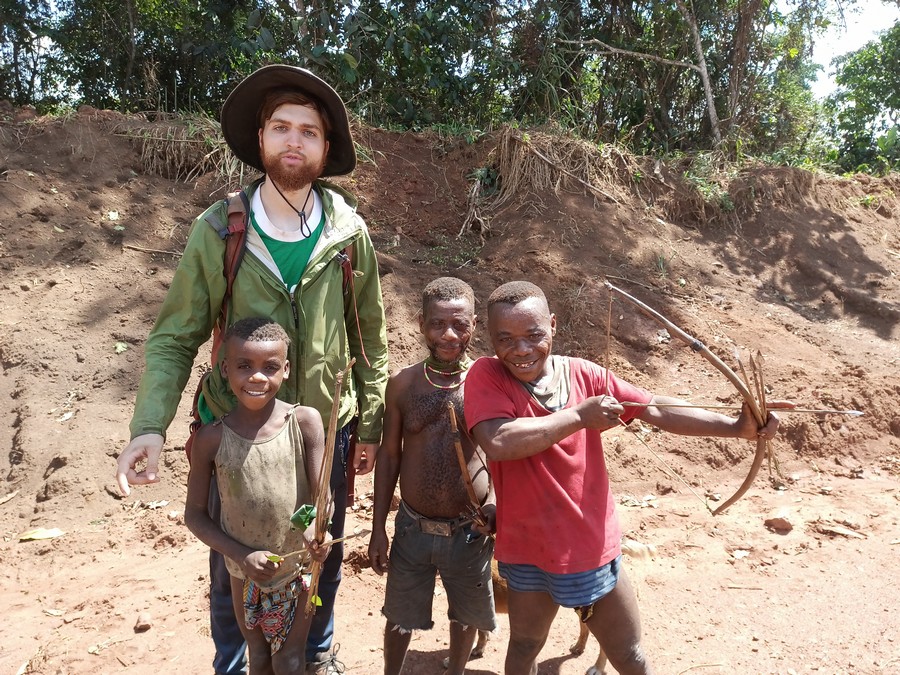
I asked the police chief if I could leave Epulu, but he said I couldn’t because the investigation was ongoing. The administrator of Mambasa had ordered that I stay in detention. He would come in a few days and wanted to meet and bring me to Mambasa, for God knows why. That was a massive red flag for me.
Mambasa is actually in a dangerous zone near the ADF, so going there would put me at risk of kidnapping, and I had no desire to get there. I planned to hunt with pygmies in the Okapi Reserve, not to go to fucking Mambasa!
I got a call from the Kinshasa Canadian embassy. A local lady who works there was on the phone. I was disappointed that I couldn’t even speak to someone from my country on the ground in the DRC (she worked there but wasn’t Canadian). Nonetheless, I stayed relaxed and explained to her the situation. She was nonchalant, totally clueless, and unsure of what to do. She was a low-level secretary. I told her I didn’t want to go to Mambasa under any circumstance and wanted to know why I wasn’t allowed to leave Epulu. They’d searched me already and found nothing. I wanted to know what the charges against me were, if any. Why was I being detained?
She was clueless and said she didn’t know who to talk to. She was the textbook example of an incompetent bureaucrat. I said she should start with the Mambasa administrator since he detained me. She asked me to get the number of the Mambasa administrator for her?! I was baffled that they didn’t have the will at the Embassy to find the number since they surely had the resources for it.
This wasn’t 1950 anymore when embassies would move heaven and earth to help their needy citizens. I hung up and told her I’d get it for her.
I spoke to the police commander of Epulu, got friendly with him, and cracked a few jokes. The mood lightened up. I eventually bluffed him, “My embassy is extremely worried about me (they weren’t and didn’t care at all) and are threatening to alert the news media if I’m not released soon. Your face will be on television. You better give me the administrator’s phone before things get out of hand. Let’s sort this out together.”
Sure enough, he gave me the phone number of the Mambasa administrator (administrateur du territoire).
I called the embassy secretary back and gave the number to her. I also needed to bluff to her (everyone knows how bureaucrats operate). I had to put pressure on her, so I said, “Call this guy and try to figure things out. If it fails and he still wants to bring me to Mambasa, I’m going to alert the news media.”
I didn’t plan to do it, but I knew that was the last thing she wanted. It was in her favor to solve the situation. I’d have to wait and see what would happen.
Knowing how the Congolese mindset worked, I bet that once the administrator knew that the Canadian government was aware of my detention, he’d panic and drop the case, thinking they would do something for me/make trouble for him.
His ignorance of the fact that my embassy couldn’t do shit for me was going to work in my favor. All he needed was one phone call from her in the name of the Canadian government, and he’d probably be intimidated (total bluff). It was a paper tiger.
“Look, bro, since you’re not letting me leave this place against my will, and I want to leave, I’m not paying for my hotel tonight. I don’t want to stay here, and you’re forcing me to,” I told the police officer.
I said that to make myself as much of a nuisance to him as possible, to hasten his desire to see me get out of Epulu. I wanted it to be a hassle for him to have me here, to see me as a burden so he wouldn’t want to have me around any longer.
“Alright, the bill is on me, don’t worry,” he said.
The police chief felt bad for detaining me. I felt like he knew I was innocent. He moved me to the other hotel in Epulu, where the room was better. I don’t think he paid for the room. He probably told the owner to let me in for free. Police commanders have a lot of power in the DRC.
Sure enough, the next day, around noon, the police chief informed me that the Mambasa administrator had said I was free to go. I later got a phone call from the Canadian embassy lady saying she’d called him and settled the matter. My plan had worked. I got written proof of the investigation and my innocence from Leonard, the judiciary police officer.
I spent the rest of the day with my guide, Francois, trying to convince the Okapi Reserve people to let me make the trip I’d agreed on with the pygmies. They never allowed me to proceed. Maxime never agreed to meet me again. The pygmy chief wanted me to come with him in the forest. He needed the money. These scumbags told the pygmy chief they’d arrest him if he went in the forest with me. I have no respect for them.
EPULU TO UGANDA
I left Epulu hitchhiking back to Nya-Nya with Somali truck drivers going to deliver oil. There was a ditch 15 km west of Epulu where people had been sleeping for 2 days waiting for the truck to be freed. Luckily, the day I passed, we only had to wait a few hours before the truck got out. I slept at a 10,000 francs-a-night hotel in Nya-Nya (near the central roundabout; you can’t miss it). The hotel was more of a brothel than anything else. Pushy prostitutes were coming to knock on my door and bother me.
The next morning, I left on foot in the direction of Isiro. I got bothered by some police/army guys on the northern edge of Nya-Nya. Not wanting to waste time, I used the phone number of the Mambasa administrator and called him. I explained to him the situation and put him on speaker. He pressured the guys to let me go. I’ve never seen people that scared.
I got a motorbike lift 50 km North from there, and the mood changed. The atmosphere lightened up. I felt like I was entering a different country.
The people became more relaxed, checkpoints became easier, and people became more laid back. A DGM woman 30km north of Nyanya asked for my phone number. Officials were easier to deal with. Things were getting easier.
On top of that, the landscape changed. The thick jungle forest gave way to a beautiful mix of forest and savannah, which the locals call savane herbeuse. And the road was overall much better than the one between Kisangani and Nyanya.
I got a motorbike lift with a diamond trader going to Isiro. We slept overnight on the way in a hut hotel for 2000 francs per room (1$). If you happen to be in Isiro, try their tiny bananas! They are smaller than regular bananas but much more sweet and tasty. They are the most delicious bananas I’ve ever tasted.
Five km east of Isiro, there’s a barrier. The guys there were great and friendly. No one asked for money. I wonder why the mood was so much better in the province of Haut Uele compared to all the other places I visited in the DRC. The guys even helped me find a lift eastward!
I got a 4X4 Jeep with 4 VIP Congolese to take me 218 km east to Gombari. They hosted me for the night. In the morning, I asked them about the possibility of seeing pygmies in the area, and they told me I could see some 26 km further east. I hitched a ride with a bike and got to the location they’d told me.
French wasn’t spoken much in that area, but I talked to some Bantu villagers and expressed my wish to go into the forest with a pygmy to learn about their lifestyle. They agreed to show me what I wanted for $5.
They spoke to a pygmy, and we all hopped on a bike and went into the woods. It was amazing to see how he collects honey traditionally: climbing up a tree with his bare hands with a smoking backpack of leaves to scatter the bees away. Unfortunately, his pygmy wife came in a panic to fetch him because she was afraid of what a white man would do to her husband. She thought I’d eat him (that’s what the Bantus told me).
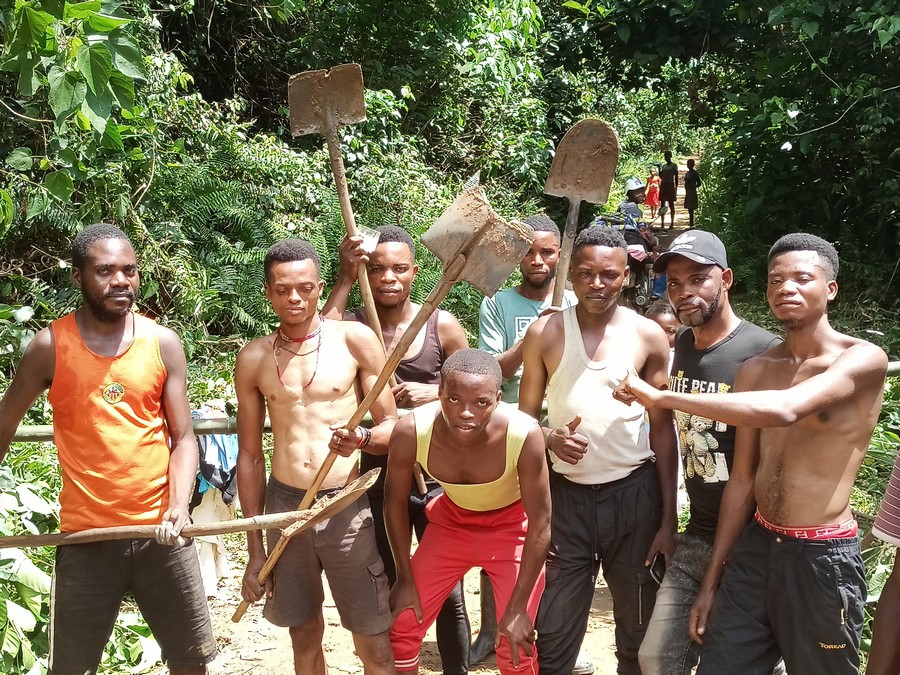
I carried on with a bike to the town of Watsa. I was briefly annoyed there by a drunken official accusing me of being a “mercenary,” but it all worked out. I made it to the town of Durba. There’s a massive gold mine near Durba, but unfortunately, I can’t visit it. I stayed with a local for the night.
According to locals, the town is super dangerous at night, so watch out! They told me there are criminal gangs that patrol the streets. Income disparity breeds violence. From there, it was 176 km to Aru on the Ugandan border! I could smell Uganda!
The next day, I left for Aru. There weren’t many vehicles on that road; traffic was lighter than expected. Nonetheless, I patiently waited and got a Ugandan truck that brought me to Aru by nightfall. Cheap hotels are available for $10 in Aru if you negotiate.
The next day, I left to go to the border, but I was turned back by the Congolese officials and told that the exit stamp was issued in Aru city rather than on the border (Congolese logic!).
I went to the DGM office in Aru and got yelled at and threatened with arrest by the chief there for getting my visa in a country of non-residence (Burundi). He told me I was illegal and was under arrest.
I stayed calm and chuckled, telling him I’d been in the country for almost 3 months and had over-landed from Angola. Moreover, the visa was given by an official embassy of his government, so he was looking for trouble!
I played some recordings in Lingala that I had from references. The officials eventually stamped me out. Their game is to see if you’re scared and apply more pressure. If you show that you are not frightened, they will back down. After being stamped out, I made it to the border and had to register my ID and name in a notebook.
There’s no logic to this country! Then they asked me to show my proof of yellow fever vaccination on the way OUT of the DRC to ensure they could get a bribe from me in case I’d lost it! Walking to the Ugandan side, I heaved a sigh of relief. I was greeted with warm smiles and friendly staff saying, “Welcome to Uganda, sir!”
I was in another world.

CONCLUSION
You will know the challenges better if you travel through the DRC overland. It’s a beautiful country with fantastic nature and wildlife. The local people are friendly and hospitable overall. It was an arduous journey with many logistical issues, health problems, and general challenges.
But the trip also showed me the best of mankind through the countless people who helped/hosted me. Don’t travel this country overland alone if you are a pushover. If you are easily intimidated by someone screaming at you, don’t do it. If you travel overland in the DRC, there will be moments where you are afraid; don’t show it.
If you find yourselves on the roads I took alone, all I can advise you is to stay tough no matter what. That’s what the DRC teaches you.
You will not be the same after crossing the DRC overland.
Good luck, and feel free to DM me if you have any questions. I will be happy to help you out!
CONNECT WITH XAVIER
His new travel company: Travel Camels
His email:
His Facebook profile
The BBC video on his Afghanistan trip
SPONSORS
Get nomadic travel insurance from SafetyWing.



